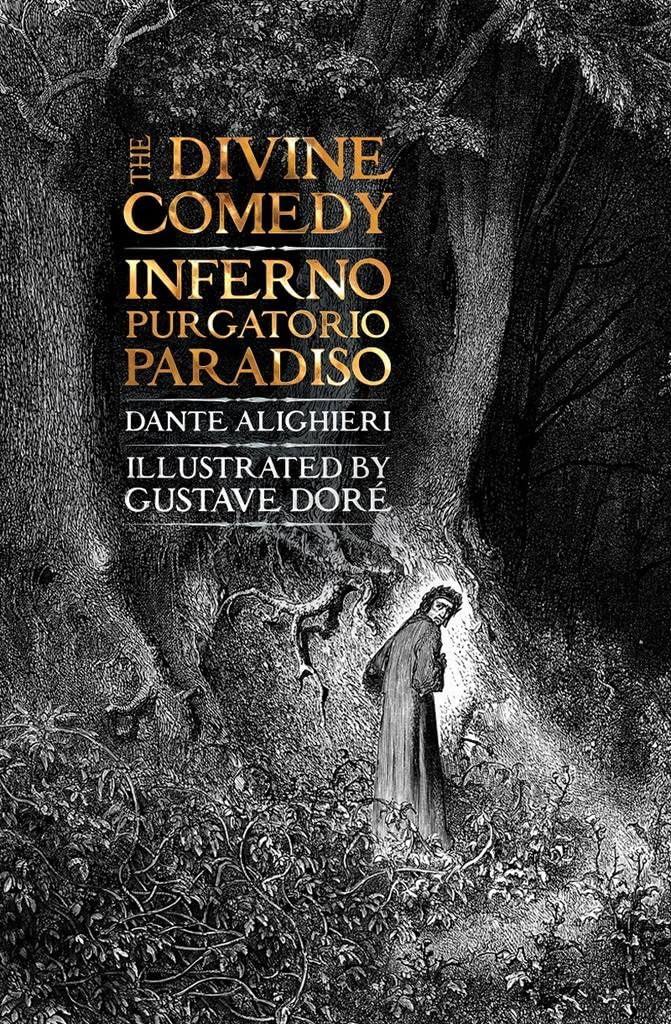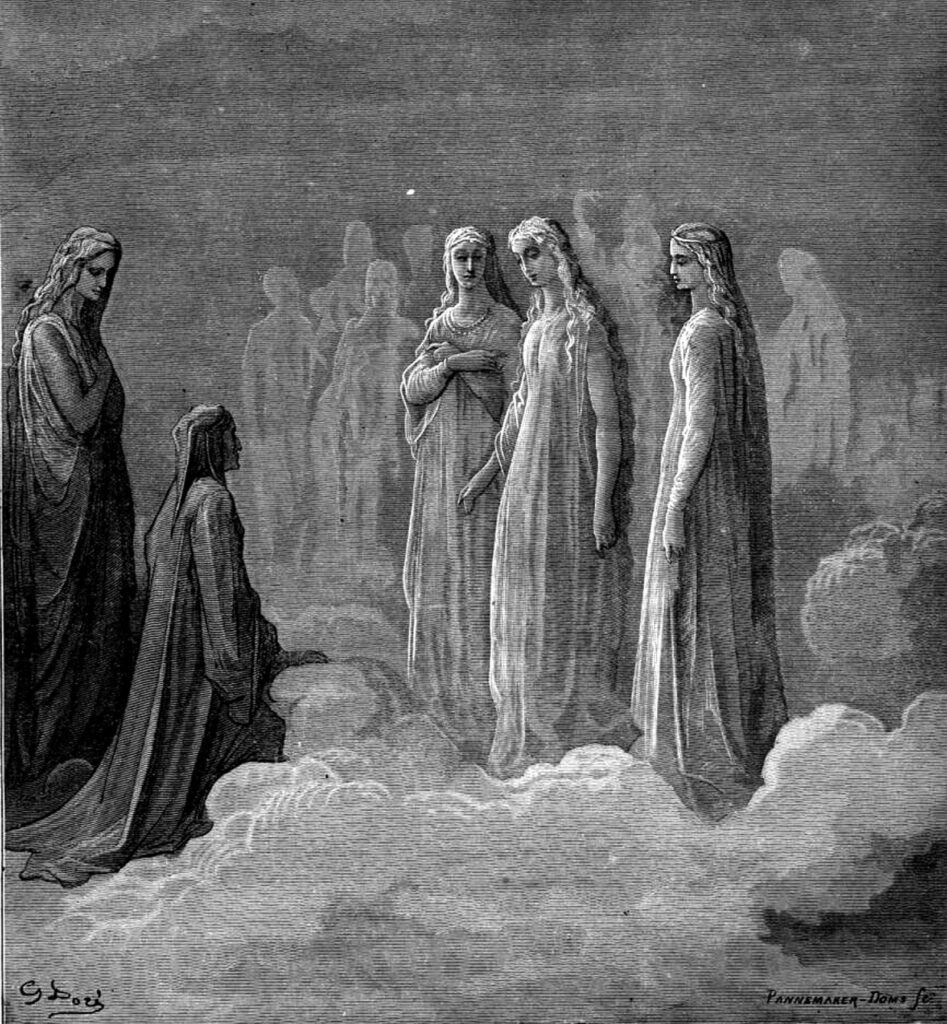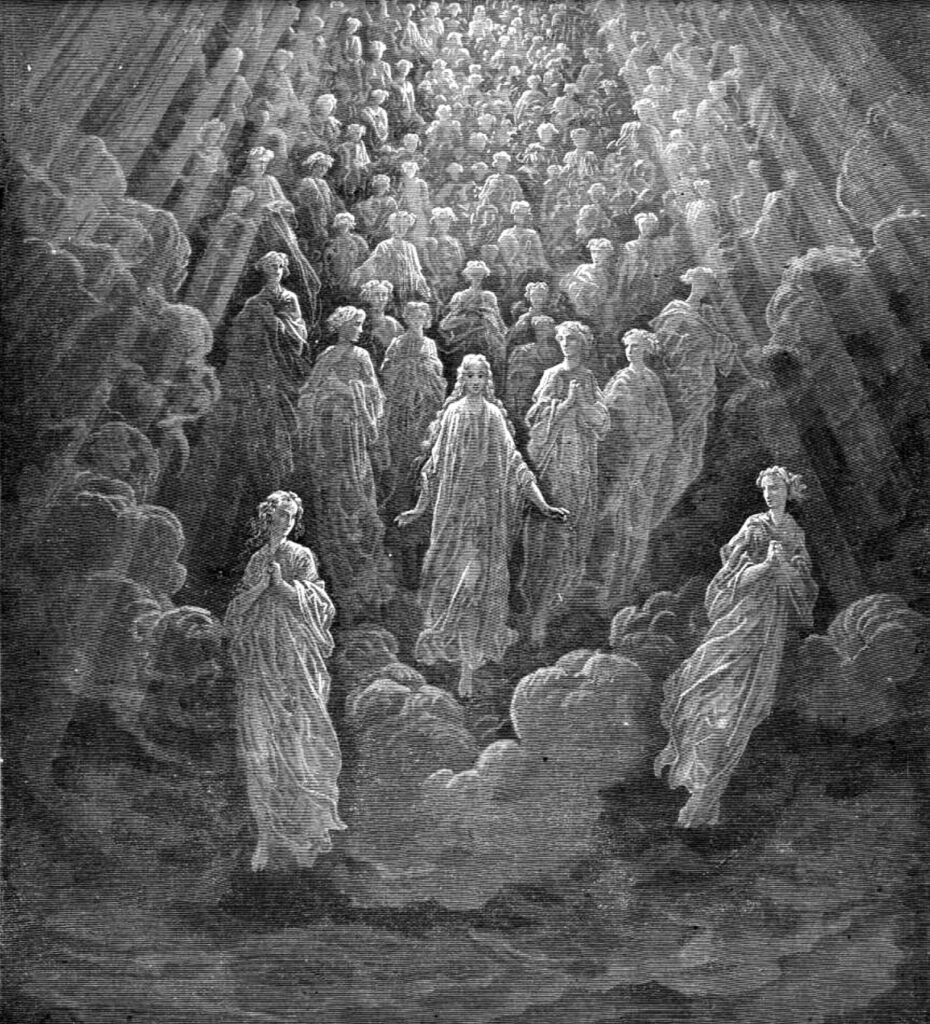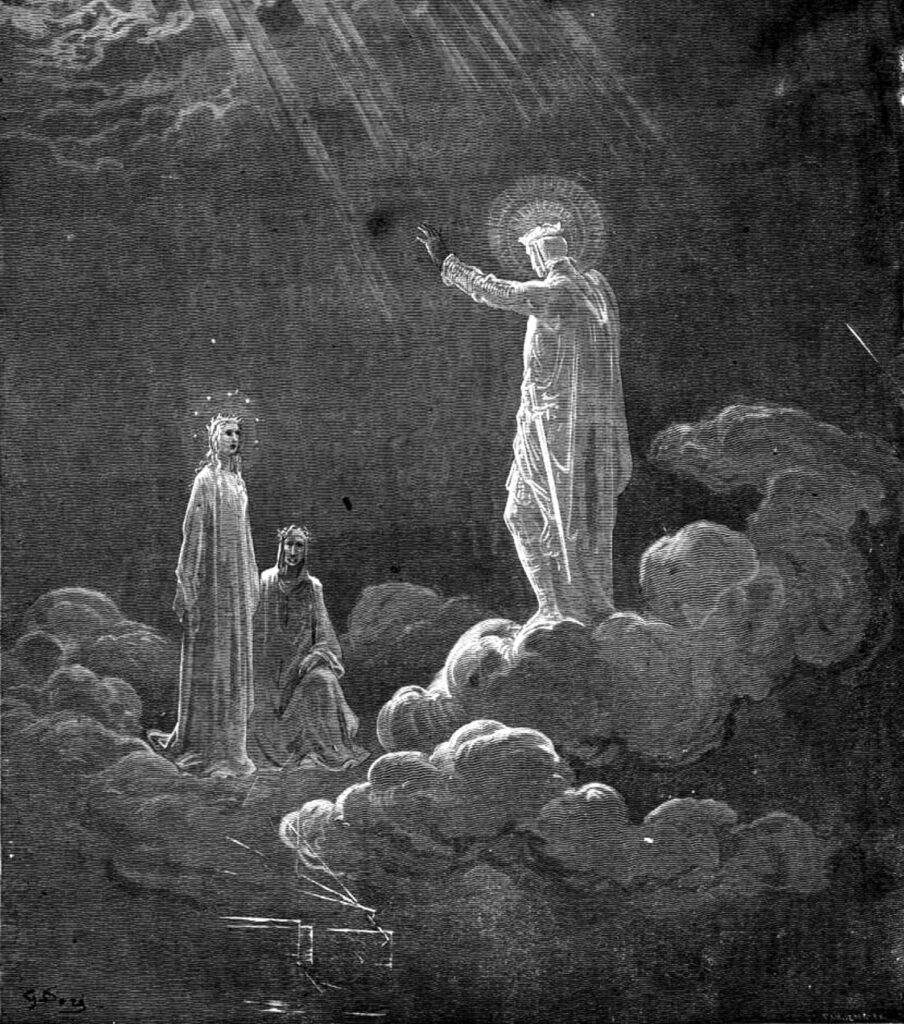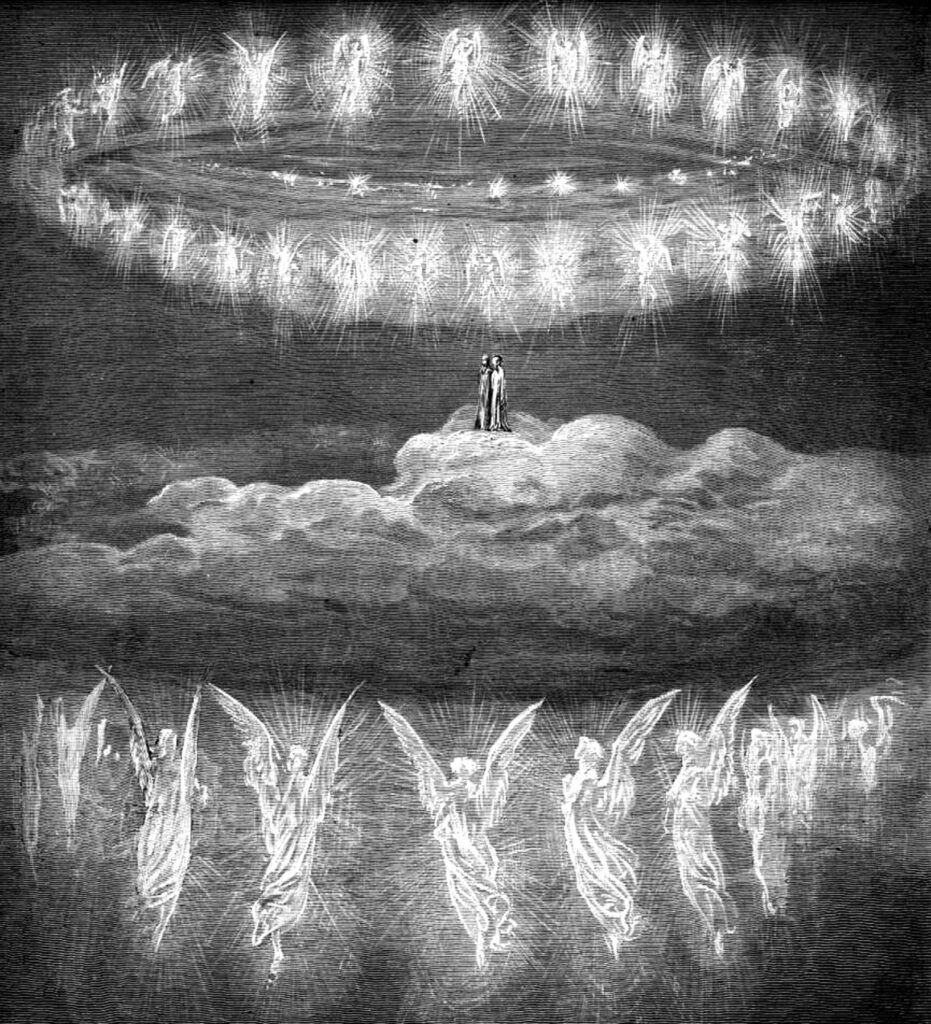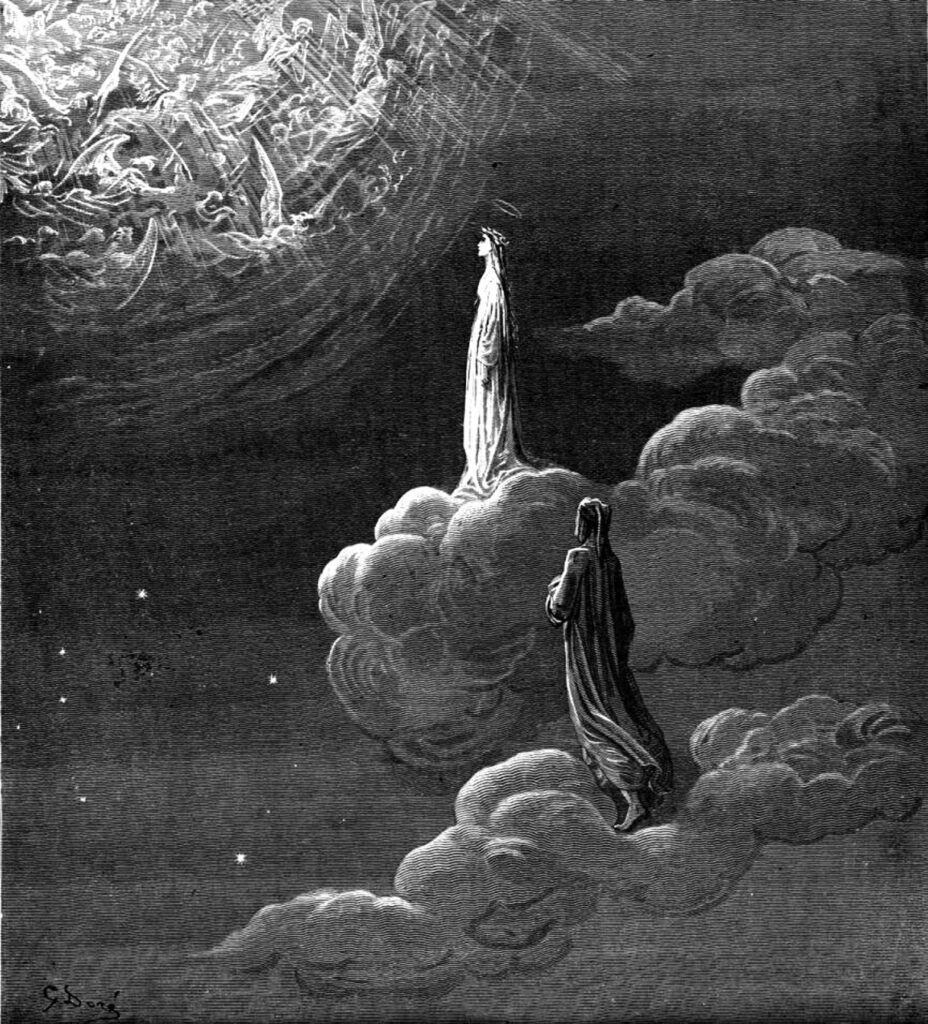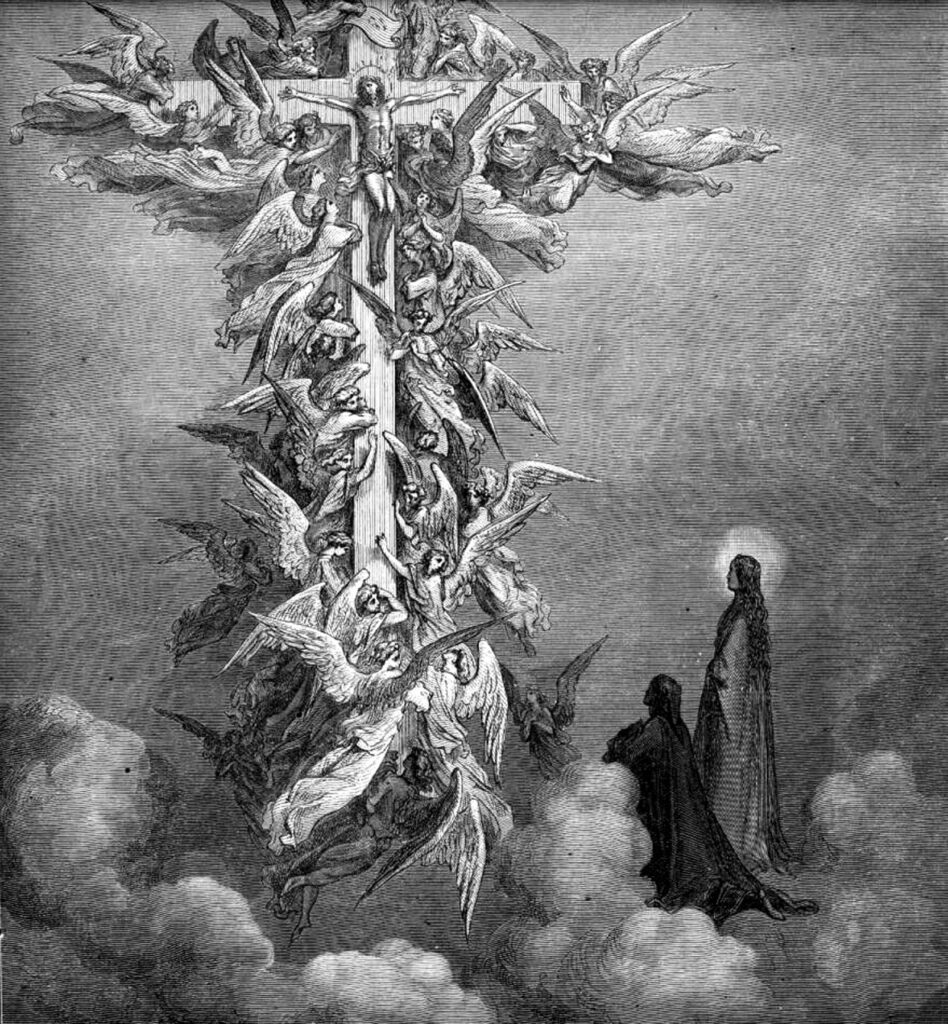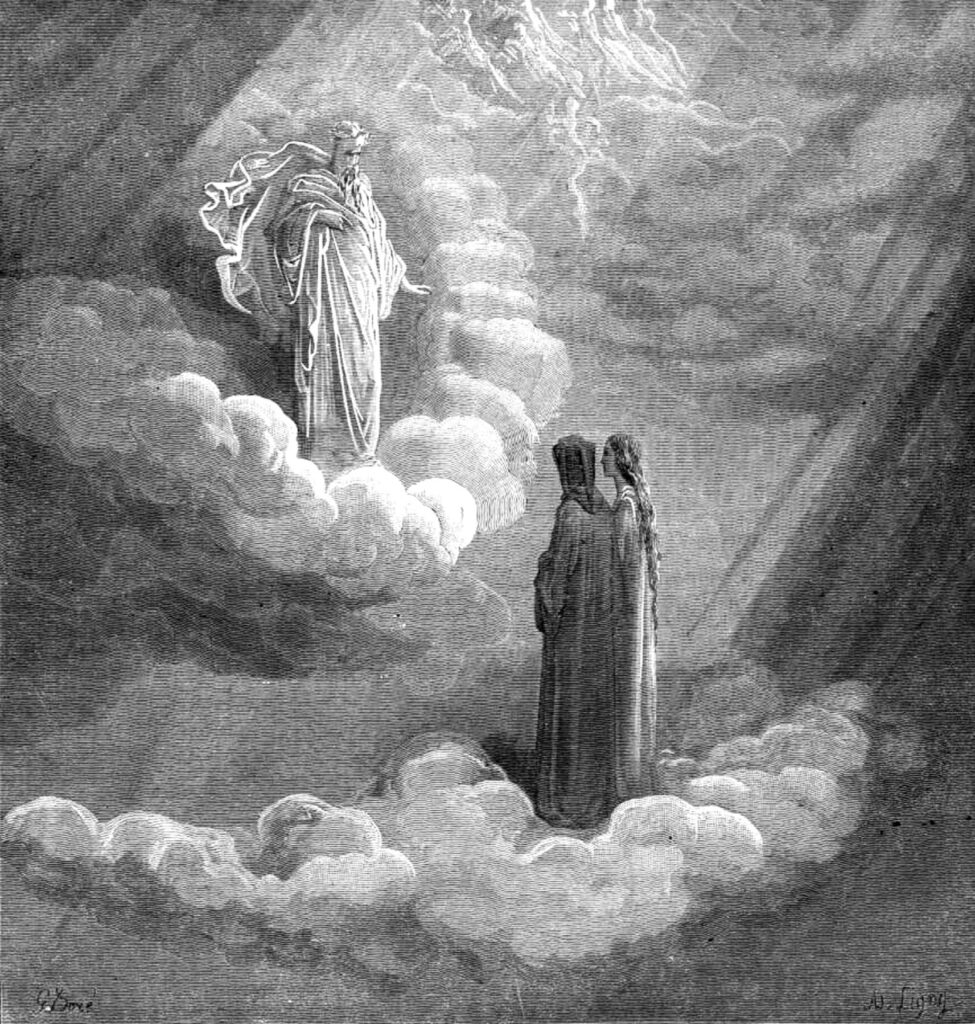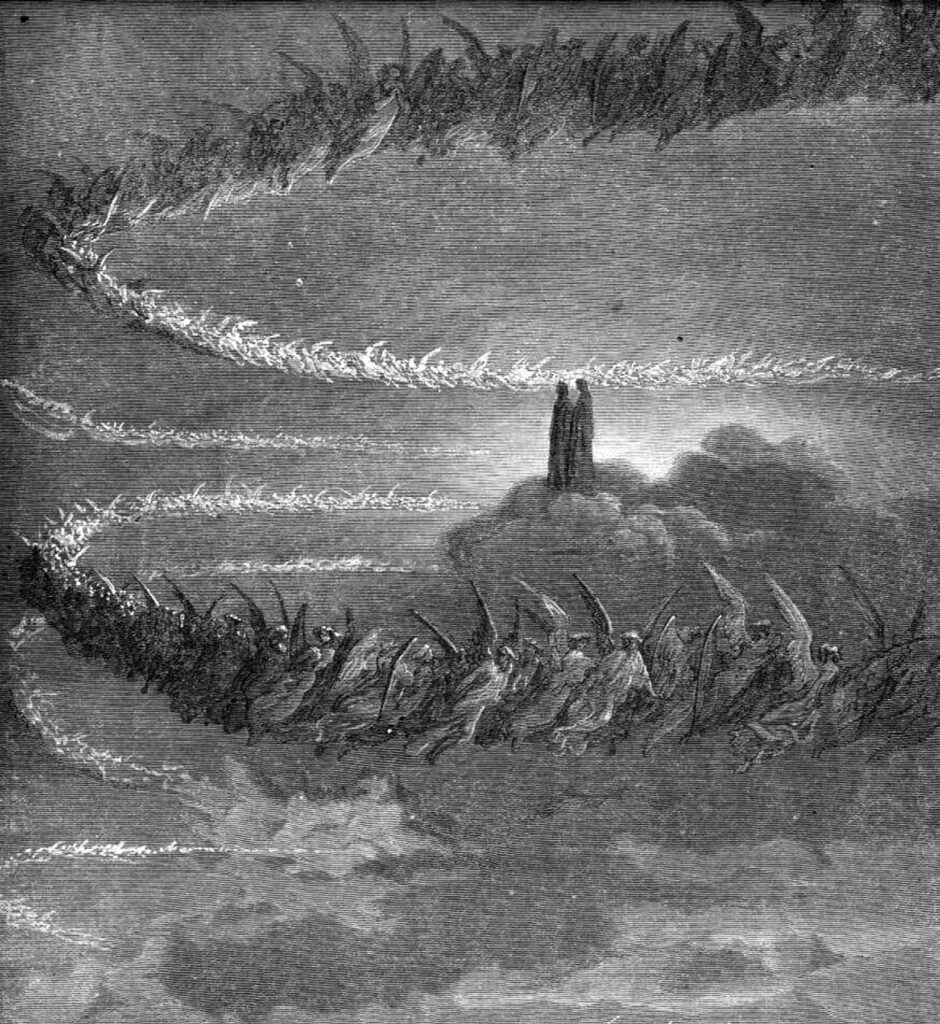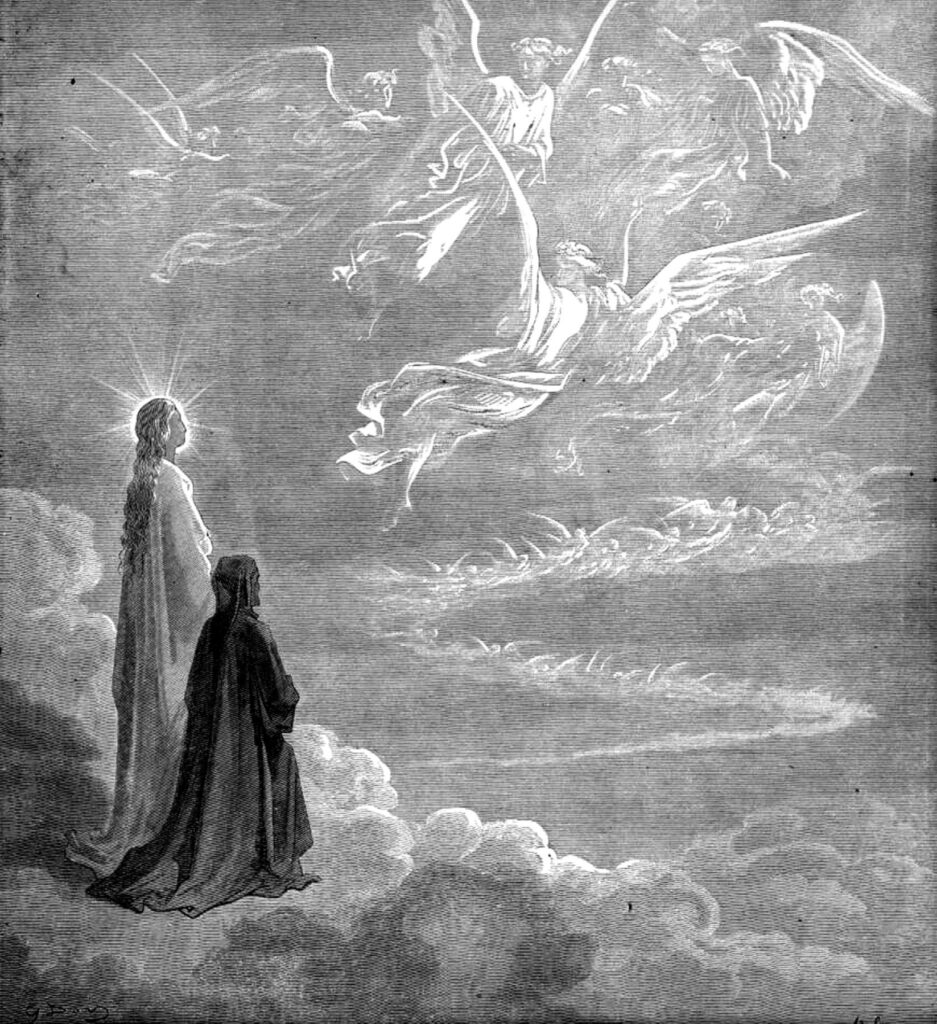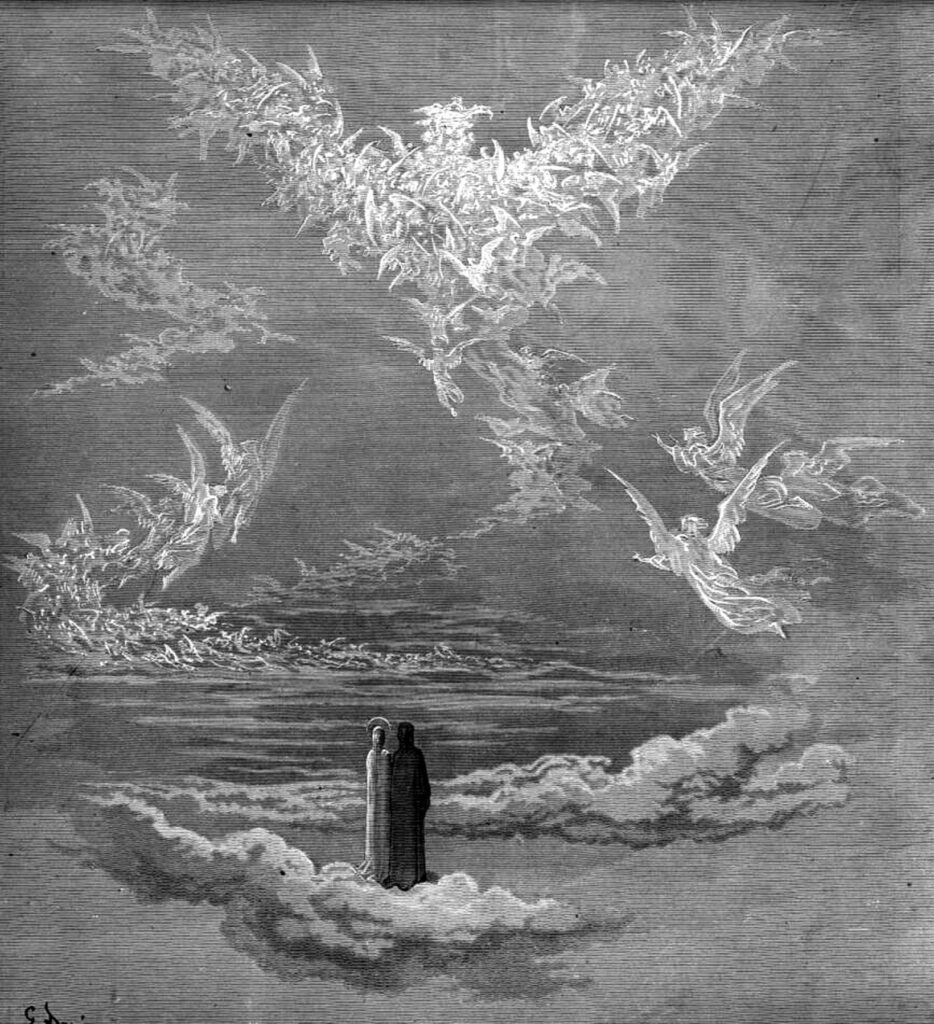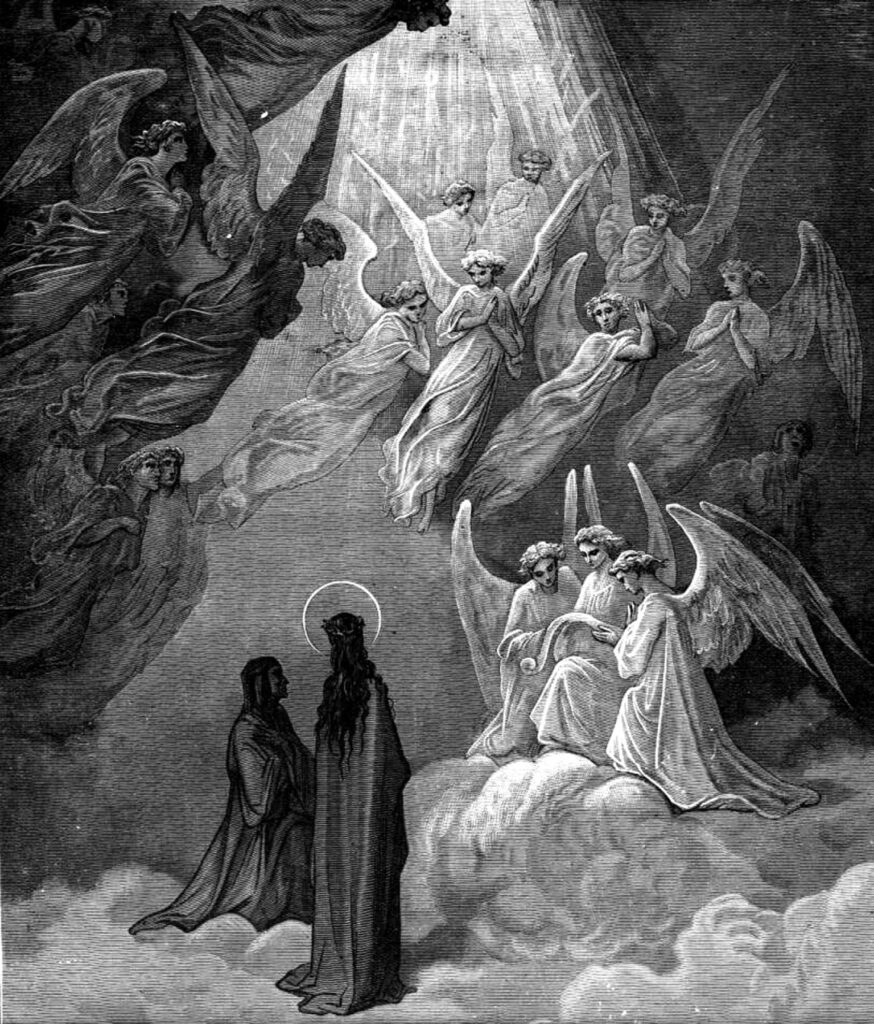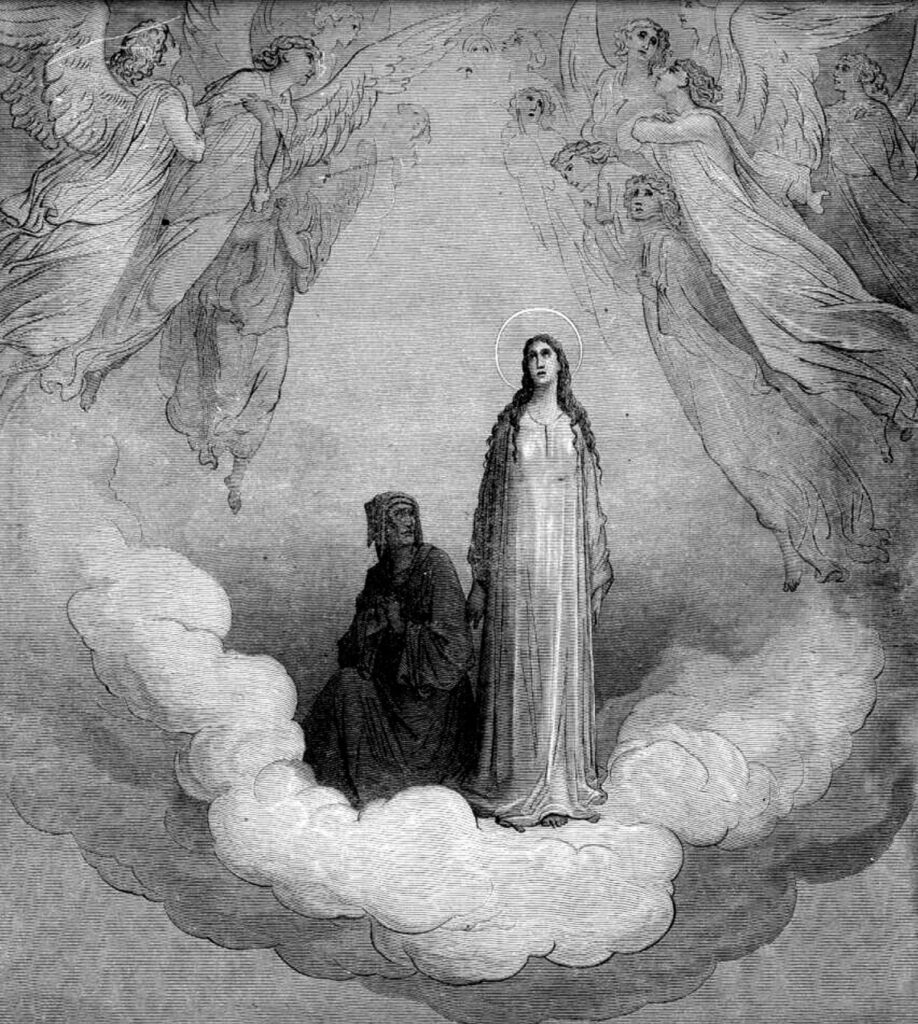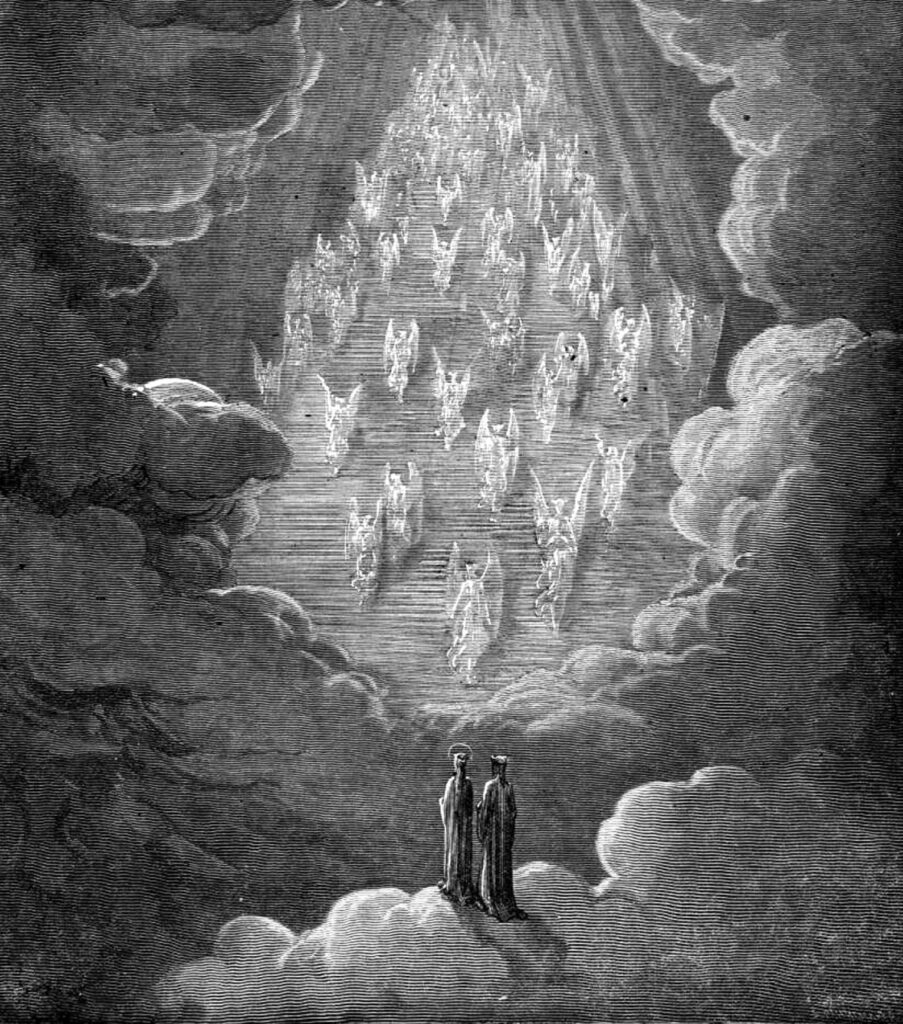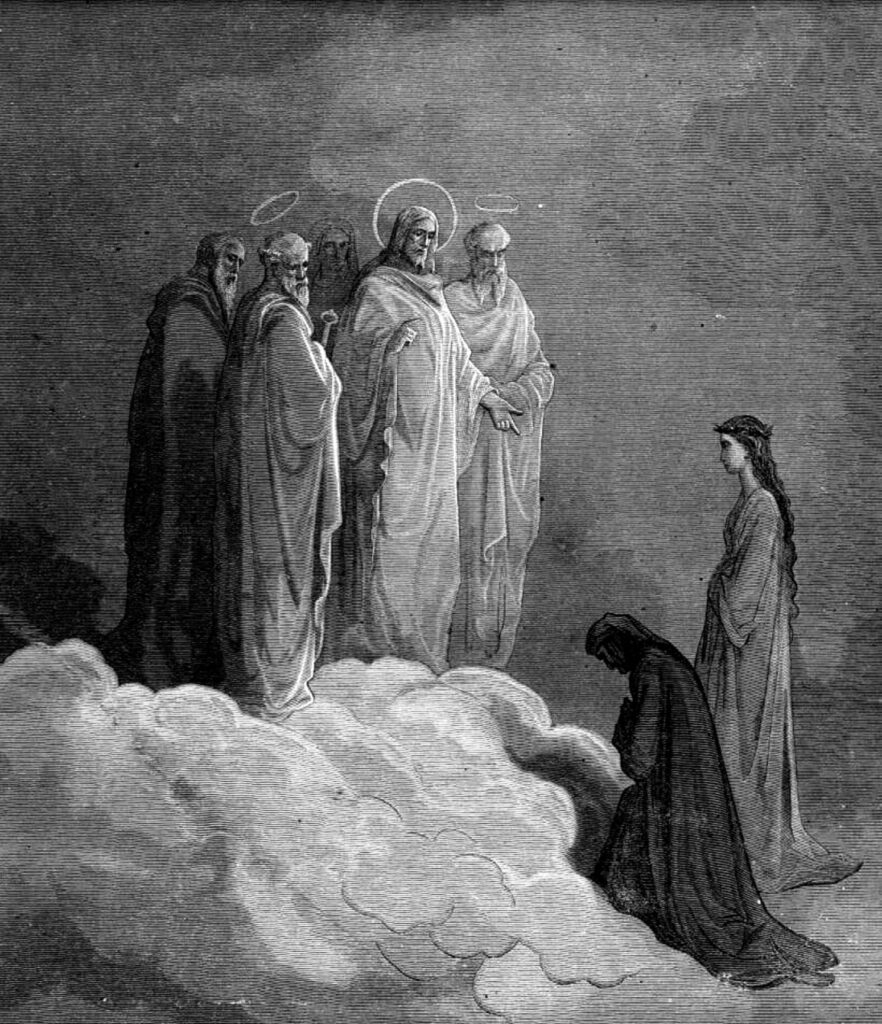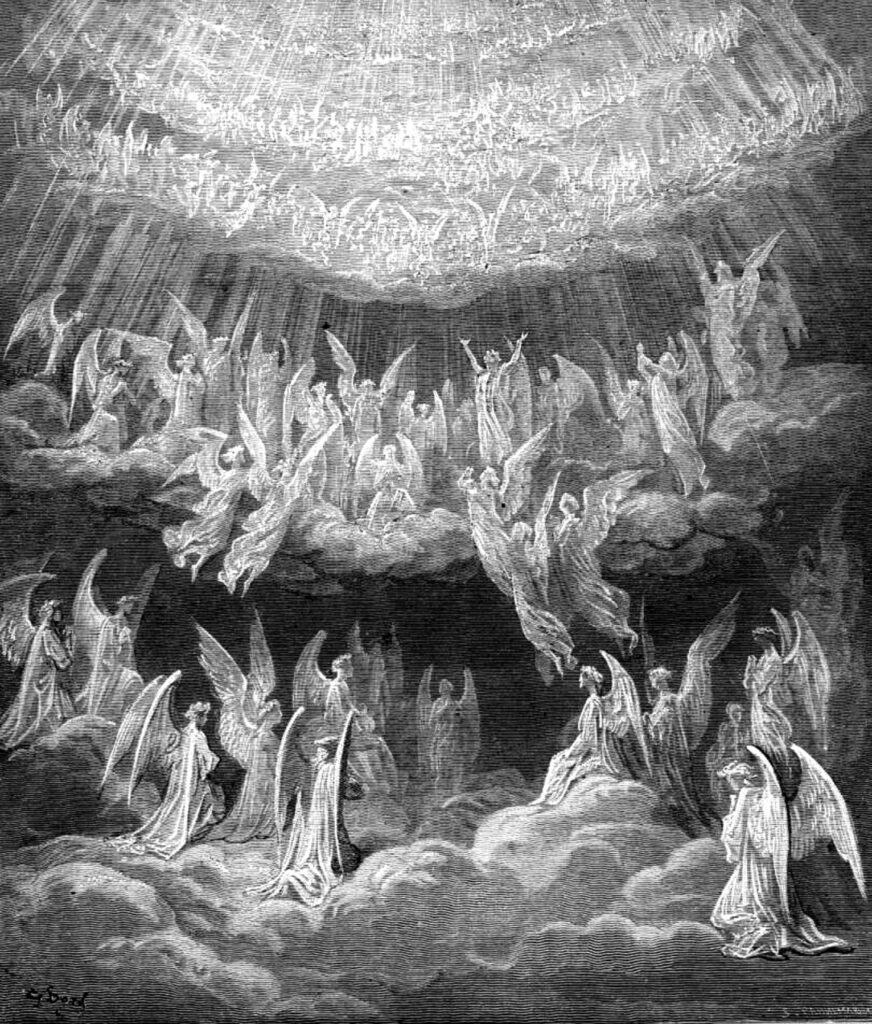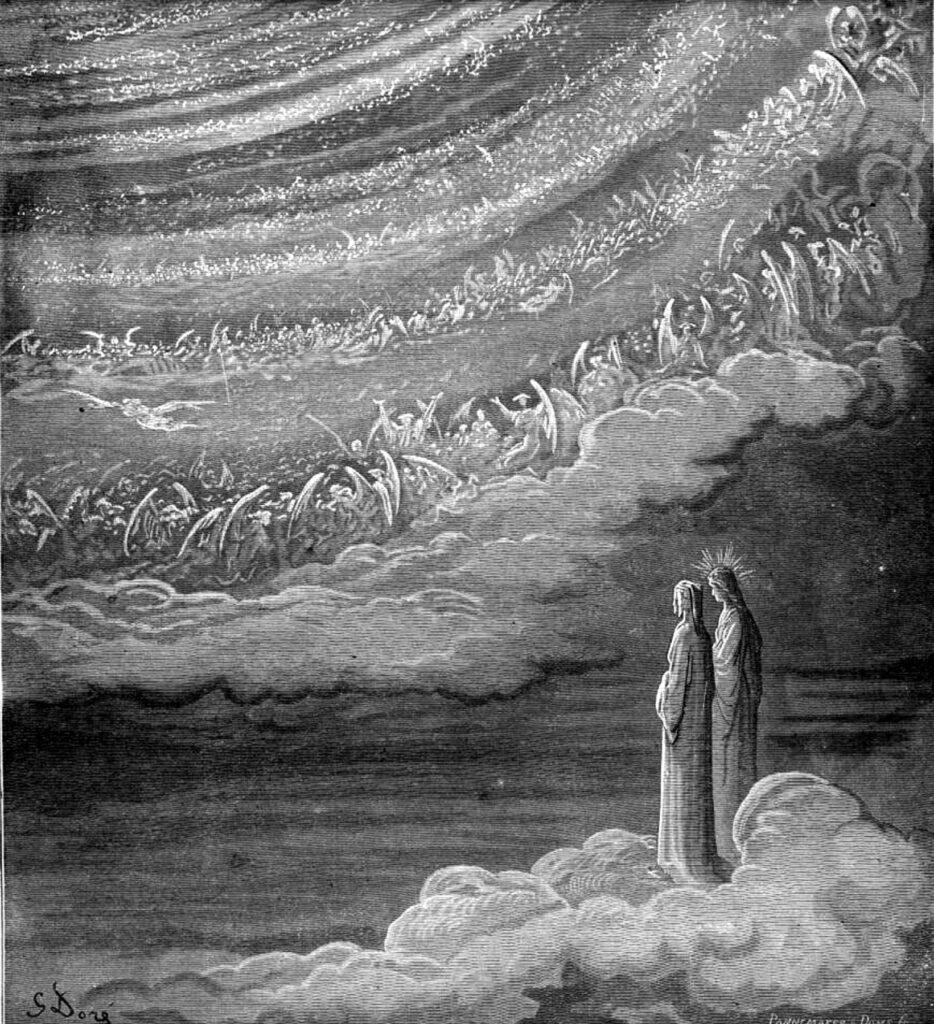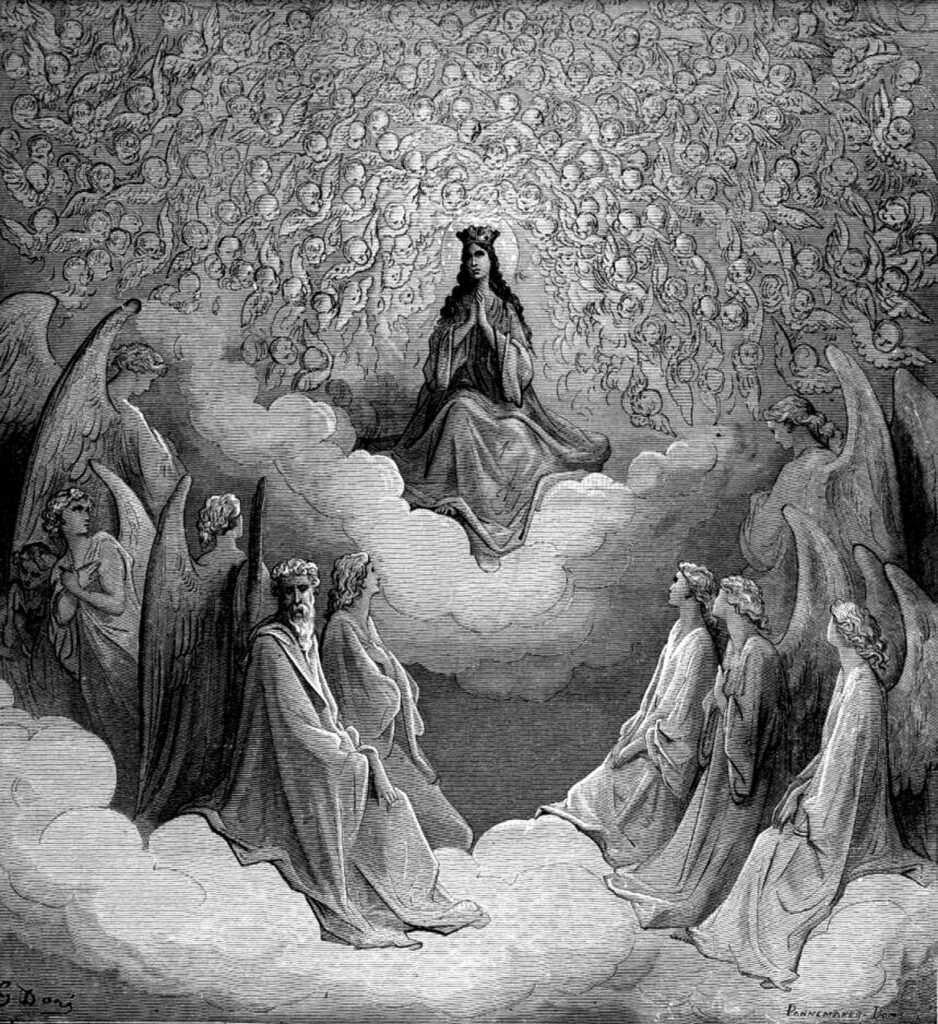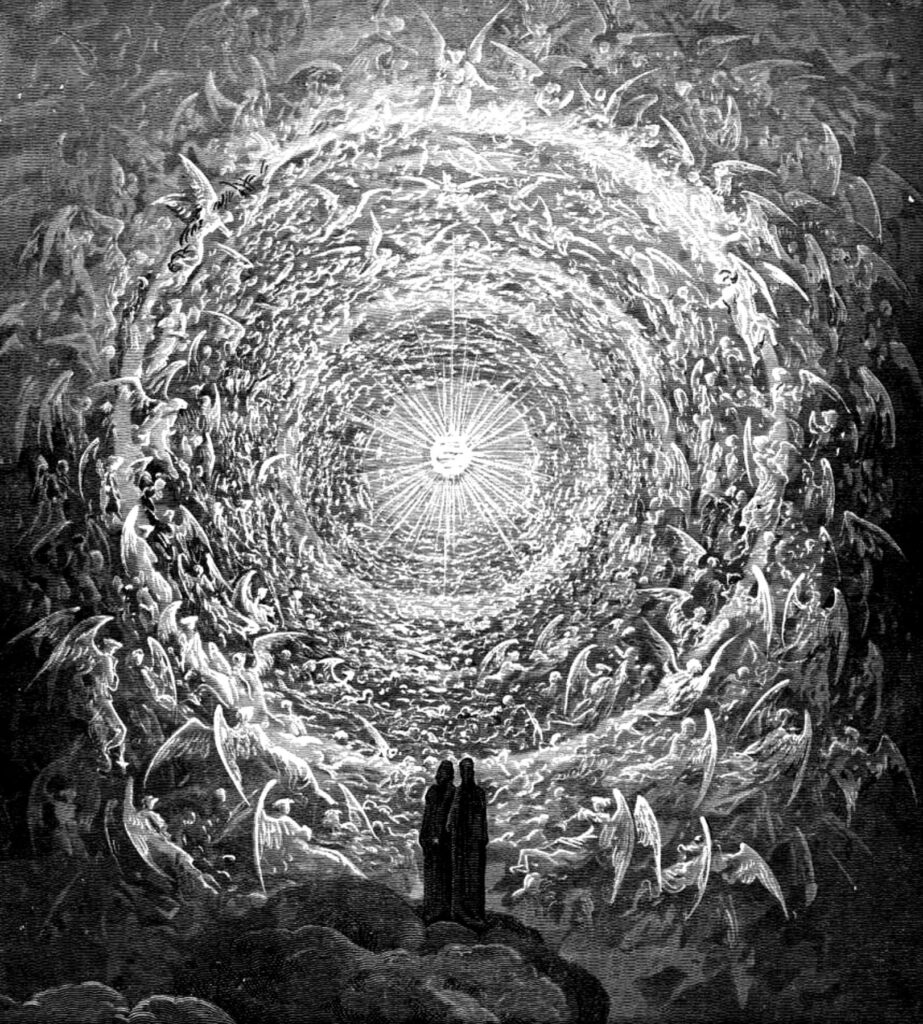In Dante’s Paradiso, the journey of the protagonist reaches its culmination in the celestial realms, where he experiences the ultimate redemption by divine grace. As Dante ascends through the various spheres of Heaven, each representing a different virtue, he encounters the blessed souls who embody these virtues, reflecting the divine light. This ascent is a metaphor for the soul’s purification and the gradual understanding of divine love and wisdom, culminating in the soul’s readiness to behold God directly.
The beatific vision is the climax of Dante’s spiritual journey, where he is granted the grace to gaze upon the divine essence itself. This vision represents the ultimate fulfillment of the soul’s longing for union with God, where all earthly desires and imperfections are transcended. In the presence of the divine, Dante experiences an overwhelming sense of peace, joy, and enlightenment. The vision of God in Paradiso epitomizes the transformative power of divine grace, where the soul achieves perfect harmony and eternal bliss, fully redeemed and united with its Creator.
Introduction
Dante’s Paradiso, the final part of his epic poem The Divine Comedy, transports readers to the celestial heights of Heaven, exploring the ultimate state of divine grace and bliss. As Dante ascends from the last circle of Purgatory into the heavenly spheres, he is guided by Beatrice, his idealized beloved who embodies divine wisdom and grace. Unlike the preceding realms of Hell and Purgatory, Paradiso is imbued with a sense of boundless light, harmony, and divine love, reflecting the spiritual perfection and unity of Heaven.
The journey through Paradiso is structured around the nine celestial spheres, each associated with different virtues and heavenly bodies, such as the Moon, Mercury, Venus, the Sun, Mars, Jupiter, Saturn, the Fixed Stars, and the Primum Mobile. Each sphere is inhabited by blessed souls who exemplify the virtues and divine attributes associated with that sphere. Dante’s ascent through these spheres is a progressive journey of spiritual enlightenment, deepening his understanding of divine truths and the nature of God’s justice and mercy.
In the Moon’s sphere, Dante encounters souls who were inconstant in their earthly vows but still received divine grace. This introduction to Paradiso highlights the theme of divine mercy, showing that even those who faltered can attain Heaven through repentance and grace. As Dante ascends to Mercury, Venus, and beyond, he meets historical and biblical figures who exemplify virtues like hope, faith, and charity, each contributing to his growing comprehension of divine love and justice.
The sphere of the Sun, associated with wisdom, presents a radiant circle of theologians and philosophers, including Thomas Aquinas and St. Bonaventure. Here, Dante delves into profound theological discussions, exploring the harmony of faith and reason. This intellectual illumination prepares him for the more intense spiritual experiences that lie ahead, underscoring the unity of divine knowledge and the eternal light of truth.
Mars, the sphere of warriors of faith, introduces Dante to his ancestor Cacciaguida, who recounts the glorious past and moral decline of Florence, offering both personal and historical reflections. This encounter emphasizes the importance of divine providence in history and personal destiny, reinforcing Dante’s mission to reflect divine justice through his poetic work.
As Dante continues to ascend, he reaches Jupiter, the sphere of just rulers. The souls here form a magnificent eagle, symbolizing divine justice. The eagle’s discourse on earthly and heavenly justice challenges Dante to consider the imperfections of human justice compared to the perfect justice of God. This sphere underscores the moral responsibility of rulers to govern with divine principles in mind.
Saturn, the sphere of contemplatives, presents the solemn and ascetic life devoted to contemplation of God. Dante meets St. Peter Damian and St. Benedict, who lament the corruption within the Church. This sphere highlights the value of spiritual introspection and the contemplative path as essential to understanding divine mysteries and achieving closeness to God.
In the Fixed Stars, Dante witnesses the triumphant Christ and the Virgin Mary, surrounded by apostles and saints. Here, he undergoes examinations by St. Peter, St. James, and St. John on the virtues of faith, hope, and love, respectively. These examinations affirm his understanding and commitment to these core Christian virtues, further preparing him for the ultimate vision of God.
The Primum Mobile, the sphere of the angels, represents the outermost moving sphere and the closest to the Empyrean. Beatrice explains the nature of the angelic hierarchies and the order of the cosmos, emphasizing the perfect harmony of creation and the role of angels in maintaining this divine order. This sphere prepares Dante for the final ascent into the Empyrean.
Finally, Dante enters the Empyrean, the realm of pure light and divine presence. Here, he beholds the celestial rose, a vast assembly of the blessed, with the Virgin Mary at its center. Guided by St. Bernard of Clairvaux, Dante’s vision culminates in the Beatific Vision, where he directly perceives God. This transcendent experience overwhelms him with divine love and understanding, achieving the ultimate union with the divine that marks the end of his spiritual journey.
Paradiso thus encapsulates the themes of divine grace, redemption, and the soul’s ultimate fulfillment in the vision of God. Through his celestial journey, Dante offers a profound exploration of the theological and philosophical dimensions of divine love, providing readers with a vision of Heaven that is both awe-inspiring and deeply reflective of the eternal truths of the Christian faith.
ASCENT
Canto I – Invocation to Paradise
Dante invokes Apollo for inspiration and enters Paradise. Beatrice explains the structure of the universe and the nature of divine love, setting the stage for their celestial journey.
Canto I sets the stage for the poet’s ascension into Heaven, following his arduous journey through Hell and Purgatory. It opens with Dante invoking Apollo, the god of poetry and prophecy, seeking divine inspiration to adequately describe his heavenly voyage. This invocation signifies the gravity and spiritual significance of the experiences he is about to narrate, emphasizing that human understanding alone is insufficient to grasp the divine mysteries he will encounter.
As Dante prepares to ascend, he acknowledges the limitations of human language and intellect in capturing the essence of divine glory. This humility is crucial, as it underscores the transformative nature of the journey and the need for divine assistance. Beatrice, representing divine wisdom, encourages him and becomes his guide in this celestial realm, much like Virgil guided him through the previous parts of his journey.
The ascent begins with Dante and Beatrice rising effortlessly into the sphere of the Moon. Here, Dante marvels at the heavenly light and the harmony of the celestial bodies. This first sphere, associated with the inconstant souls who broke their vows, introduces the theme of divine justice and the varying degrees of blessedness among the saved. Beatrice explains the structure of the universe and the influence of the celestial spheres on earthly events, framing the cosmology that governs the rest of Paradiso.
In this canto, Dante also explores the relationship between human free will and divine grace. Beatrice’s explanations emphasize that while celestial influences exist, human beings possess the free will to choose their paths. This concept is critical in understanding the moral and theological framework of The Divine Comedy, where individual choices determine one’s fate in the afterlife.
The canto is rich with symbolism and theological insight, as Dante reflects on the nature of divine light. The light in Heaven is not merely physical but represents divine truth and wisdom, illuminating the souls of the blessed and allowing them to see God more clearly. This illumination contrasts with the darkness and obscurity found in Hell, symbolizing the ultimate enlightenment that comes from divine grace.
Dante’s encounter with Beatrice in the heavenly realm also highlights the transformation of their relationship. No longer just an earthly muse, Beatrice embodies divine wisdom and grace, guiding Dante toward a deeper understanding of God’s love and justice. Her presence reinforces the idea that divine guidance is essential for attaining true knowledge and spiritual fulfillment.
Canto I thus serves as a profound introduction to Dante’s celestial journey, establishing key themes of divine illumination, free will, and the necessity of grace. Through vivid imagery and theological discourse, Dante invites readers to join him in contemplating the nature of divine justice and the soul’s ultimate destiny. This canto sets the tone for the transformative journey that will unfold in the subsequent spheres of Heaven, leading to the ultimate vision of God.
THE MOON (The Sphere of the Inconstant)
Canto II – Entering the Sphere of the Moon
They ascend to the Moon’s sphere, where Beatrice explains the influence of celestial bodies on human fate and introduces the souls residing in the sphere of the inconstant.
Canto II delves deeper into the celestial journey as Dante, guided by Beatrice, ascends into the first sphere of Heaven, the Moon. The canto begins with Dante expressing his awe at the swift and effortless ascent, a movement he attributes to divine grace and the inherent lightness of his soul now freed from sin. This initial wonder sets the tone for the exploration of divine mysteries and celestial mechanics that follow.
Beatrice explains to Dante the nature of the Moon’s sphere, addressing his curiosity about the varying brightness of its surface. She elucidates that these variations are not due to intrinsic imperfections but rather the different degrees of divine influence on the celestial bodies. This explanation highlights a key theme in Paradiso: the harmonious order of the cosmos, where each part reflects God’s perfect design.
The conversation shifts to a more profound discussion of the human soul’s relationship with the divine. Beatrice articulates the idea that every soul has an innate desire to return to its divine source, a longing that propels the soul upwards toward God. This intrinsic drive is a reflection of the soul’s creation by God and its ultimate fulfillment in unity with Him, underscoring the spiritual ascent as a return to divine origin.
Dante’s encounter with the blessed souls in the Moon’s sphere reveals another crucial aspect of Paradiso: the differentiation of beatitudes. The souls in this sphere, while blessed, are those who were inconstant in their vows on earth. Their lesser degree of blessedness does not diminish their happiness but rather illustrates the varying capacities for receiving divine grace, tailored to the individual’s earthly life and choices.
Beatrice’s explanations are not merely didactic; they are also imbued with a sense of divine love and compassion. Her role as a guide in this canto reinforces the necessity of divine wisdom for comprehending celestial truths. Beatrice’s presence is a constant reminder that reason and faith must work together to grasp the complexities of divine justice and the order of the universe.
As the canto progresses, Dante’s own transformation becomes evident. His spiritual and intellectual enlightenment is portrayed through his increasing ability to understand Beatrice’s teachings and the divine truths she reveals. This growth reflects the broader theme of The Divine Comedy: the soul’s journey towards ultimate enlightenment and union with God, facilitated by divine grace and guidance.
Canto II is a rich tapestry of theological insights, celestial mechanics, and the profound relationship between the human soul and the divine. Through Beatrice’s guidance, Dante begins to comprehend the harmonious order of Heaven and the varying degrees of blessedness among the souls. This canto sets a contemplative and enlightening tone for the rest of Paradiso, inviting readers to reflect on the nature of divine justice, the soul’s yearning for God, and the ultimate fulfillment found in celestial harmony.
Canto III – Piccarda Donati and Constance of Sicily
Dante meets Piccarda Donati and Constance of Sicily, who explain their presence in the Moon due to broken vows, emphasizing the importance of faithfulness to one’s commitments.
Canto III continues the poet’s journey through the heavenly spheres as he explores the Moon, where he encounters the blessed souls who were inconstant in their vows. The canto begins with Dante seeing faint, ghost-like figures and initially mistaking them for reflections. Beatrice clarifies that these are indeed souls, appearing faint due to the lesser degree of blessedness they possess in comparison to those in higher spheres.
Among these souls, Dante meets Piccarda Donati, a nun who was forcibly removed from her convent and married against her will, breaking her vows of chastity. Piccarda’s serene acceptance of her fate and her continued devotion to God despite her earthly tribulations highlight the theme of divine justice and mercy. She explains that while she and others in her sphere did not achieve the highest level of virtue, they are still fully content with their place in Heaven, demonstrating the harmony and fulfillment found in divine grace.
Piccarda introduces Dante to another soul, Constance of Sicily, who shares a similar story of broken vows. Through their conversations, Dante learns that the souls in the Moon are content with their lot because they understand and accept the divine order. This acceptance underscores the idea that divine justice perfectly matches each soul’s capacity for grace and virtue, allowing for complete satisfaction and peace within Heaven’s hierarchy.
Beatrice further explains the theological implications of Piccarda’s story, emphasizing that vows made to God must be honored unless a higher authority releases one from them. This discourse deepens Dante’s understanding of the importance of free will and the serious nature of commitments made to the divine. The canto highlights the tension between earthly circumstances and divine expectations, illustrating how divine mercy can rectify human shortcomings.
The serene and harmonious atmosphere of the Moon’s sphere contrasts sharply with the turmoil of Hell and the struggle of Purgatory, emphasizing the peace that comes with divine grace and the acceptance of divine will. The souls’ luminous contentment despite their lesser blessedness provides a powerful image of the ultimate fulfillment found in Heaven. Dante’s interactions with Piccarda and Constance serve to illustrate the nuanced understanding of divine justice that permeates Paradiso.
As Canto III concludes, Dante reflects on the profound lessons learned from these souls. Their stories reinforce the overarching themes of the epic: the necessity of free will, the sanctity of vows, and the perfect justice of God. The encounters also serve to prepare Dante for the deeper theological insights and more intense spiritual experiences that await him in the higher spheres of Heaven.
Canto III thus enriches the narrative by exploring the complexities of divine justice and the acceptance of divine will. Through his encounters with the blessed souls in the Moon’s sphere, Dante gains a deeper understanding of the divine order and the perfect harmony of Heaven, setting the stage for his continued ascent and further enlightenment.
Canto IV – Explanation of the Sphere’s Characteristics
Beatrice clarifies doubts about the Moon’s sphere and divine justice, discussing the nature of free will and the reasons souls appear in different celestial spheres.
Canto IV addresses the doubts and intellectual curiosity of the poet as he grapples with the concepts of divine justice and the gradations of blessedness among souls in Heaven. As the canto begins, Dante is troubled by the sight of Piccarda and Constance in the Moon’s sphere and questions how it is possible for souls in Heaven to experience different levels of happiness. Beatrice perceives his confusion and offers an explanation to dispel his doubts.
Beatrice explains that all souls in Heaven are perfectly content because their wills are in complete harmony with God’s will. Each soul’s capacity for divine grace is different, and God’s justice ensures that every soul receives as much bliss as it can contain. This concept illustrates the theme of divine justice, where differences in blessedness do not imply any injustice but rather reflect the infinite variety within divine perfection. Beatrice’s teachings emphasize the importance of understanding and accepting God’s will to achieve true contentment.
To further clarify, Beatrice delves into a theological discourse on the nature of vows and free will. She distinguishes between vows that are absolute and those that can be modified by higher authorities, highlighting the sanctity of vows made directly to God. This discussion reinforces the significance of intention and commitment in spiritual matters, illustrating how divine justice accounts for the complexities of human life and choices.
The canto also explores the philosophical implications of divine justice and the human intellect’s capacity to grasp divine truths. Dante’s quest for understanding reflects the human desire for knowledge and the limits of human reason when faced with divine mysteries. Beatrice’s role as a guide and teacher underscores the necessity of divine wisdom to fully comprehend the nature of the universe and the justice of God.
Canto IV is a profound exploration of theological and philosophical themes, addressing the intricacies of divine justice and the nature of blessedness in Heaven. Through Beatrice’s explanations, Dante gains a deeper understanding of the harmony and perfection that characterize the divine order. This canto continues to build on the foundational themes, preparing Dante for the even more profound revelations that await him in the higher spheres.
Canto V – Divine Will and the Moon’s Influence
Continuing in the Moon, Beatrice elaborates on the sanctity of vows and free will, illustrating how divine grace perfects human actions and the consequences of neglecting one’s vows.
Canto V delves into the profound themes of free will and the sanctity of vows. As Dante and Beatrice continue their ascent, Dante is troubled by the notion of vows and the consequences of breaking them, prompted by his recent encounter with Piccarda. This concern sets the stage for Beatrice’s theological exposition, aiming to clarify and deepen Dante’s understanding of these crucial spiritual concepts.
Beatrice begins by explaining the inherent sanctity of vows made to God, emphasizing that they are binding and should be fulfilled with utmost sincerity. She discusses how vows, when made, represent a significant act of free will, where one offers a part of themselves directly to the divine. This act of devotion is seen as a pathway to spiritual elevation, underscoring the importance of intention and commitment in one’s spiritual journey.
To elucidate her point, Beatrice uses the metaphor of a coin, symbolizing a vow, which cannot be reclaimed once given. This metaphor highlights the irrevocability of such commitments and the spiritual significance of maintaining them. Beatrice’s discourse stresses that breaking a vow equates to a failure in maintaining one’s spiritual integrity and fidelity to God.
However, Beatrice also introduces the concept of dispensation and commutation of vows. She explains that the Church, through its authority, can modify or release individuals from their vows if circumstances necessitate. This provision underscores the compassionate aspect of divine justice, acknowledging human frailty and the complexities of life while maintaining the sanctity of vows.
As they ascend further, Beatrice’s explanations become more intricate, addressing the interplay between divine grace and human free will. She elucidates that while vows are sacred, the exercise of free will in making and keeping vows is an essential component of spiritual growth. This dual emphasis on divine grace and human responsibility highlights the balanced nature of Dante’s theological framework.
Dante’s reaction to Beatrice’s teachings reveals his growing comprehension and acceptance of these profound truths. His initial confusion and doubt transform into clarity and deeper insight, reflecting his ongoing spiritual maturation. Beatrice’s guidance helps Dante reconcile his human concerns with the divine order, preparing him for the more profound spiritual experiences that lie ahead.
The canto also subtly portrays the dynamic between Dante and Beatrice, emphasizing her role as an enlightened guide who bridges the gap between human understanding and divine wisdom. Her patient and thorough explanations exemplify the nurturing aspect of divine guidance, which is essential for Dante’s spiritual ascent.
Canto V serves as a pivotal moment in Dante’s journey, deepening his understanding of the sanctity of vows and the exercise of free will within the framework of divine justice. Beatrice’s teachings illuminate the nuanced relationship between human commitment and divine grace, preparing Dante for the increasingly profound theological insights that he will encounter in the higher spheres of Heaven.
MERCURY (Sphere of the Ambitious)
Canto VI – Emperor Justinian
On Mercury, Dante meets Emperor Justinian, who recounts the history of the Roman Empire and the role of divine justice, highlighting the intertwining of political and divine history.
Canto VI introduces Dante and Beatrice in the sphere of Mercury, the second celestial sphere, where the souls of those who pursued honor and fame on Earth reside. Here, Dante encounters the soul of Emperor Justinian, who recounts his life and significant contributions to the Roman Empire, particularly his codification of Roman law. Justinian’s narrative is not only a personal history but also a broader reflection on the intertwining of divine providence and human history.
Justinian’s account begins with a reflection on his role as emperor and his conversion to Christianity, which redefined his understanding of justice and governance. His narrative emphasizes the importance of aligning earthly power with divine will, suggesting that true justice can only be achieved through divine guidance. This perspective reinforces one of the central themes of The Divine Comedy: the necessity of harmonizing human actions with divine intentions.
In his discourse, Justinian also addresses the historical significance of the Roman Empire, presenting it as an instrument of divine providence. He explains how the Empire, despite its flaws and corrupt leaders, served a crucial role in the unfolding of God’s plan, particularly in preparing the way for the advent of Christianity. This historical overview illustrates the idea that divine grace can work through even imperfect human institutions.
The canto also delves into the concept of divine justice, contrasting it with human justice. Justinian’s narrative highlights the limitations and often flawed nature of human legal systems, underscoring the perfection of divine justice. This comparison serves to elevate the reader’s understanding of justice from a mere earthly construct to a divine principle that governs the cosmos.
Dante’s interaction with Justinian is also marked by a reflection on the role of fame and honor. The souls in Mercury pursued earthly glory, but their ultimate fulfillment comes from their alignment with divine will, not their temporal achievements. This theme challenges the reader to consider the transient nature of worldly accolades and the enduring value of spiritual alignment with divine purposes.
Beatrice, throughout this encounter, provides additional insights and clarifications, helping Dante to fully grasp the significance of Justinian’s words. Her guidance ensures that Dante’s understanding is not merely intellectual but also deeply spiritual, preparing him for the higher spheres of Heaven where he will encounter even more profound truths.
Canto VI thus serves as a rich exploration of the figure Emporer Justin. Dante reflects on the intersection of human history and divine providence, the nature of true justice, and the ultimate source of human fulfillment. This canto deepens the reader’s appreciation of the divine order and sets the stage for the continued ascent through the celestial realms.
Canto VII – The Atonement and Redemption
Justinian explains Christ’s redemptive sacrifice and its necessity for human salvation, discussing the interplay between divine justice and mercy in the grand scheme of redemption.
Canto VII continues the profound theological discourse initiated in the previous cantos, focusing on themes of redemption and divine justice. Dante, still in the sphere of Mercury, listens as Beatrice explains the necessity of Christ’s incarnation and sacrifice for humanity’s salvation. This canto delves deeply into the theological underpinnings of Christian doctrine, emphasizing the interplay between divine justice and mercy.
Beatrice begins by addressing Dante’s doubts regarding the rationale behind Christ’s sacrifice. She explains that human nature, tainted by original sin, required a divine intervention to be restored to its original purity. The incarnation of Christ, both fully human and fully divine, was essential for bridging the gap between humanity and God, enabling the redemption of human souls through divine grace. This explanation reinforces the idea that divine justice is perfectly balanced with divine mercy, a central theme in Dante’s vision of the afterlife.
The discussion in this canto also touches upon the concepts of free will and divine foreknowledge. Beatrice elucidates that while God possesses foreknowledge of all events, human beings retain free will to make their own choices. This relationship between divine omniscience and human freedom is crucial in understanding the moral framework within which Dante’s cosmology operates. It underscores the responsibility of individuals to make righteous choices, even within the scope of divine providence.
As Beatrice expounds on these complex theological issues, Dante’s understanding deepens, reflecting his growing spiritual maturity. The canto illustrates the transformative power of divine wisdom, as Dante moves from confusion to clarity under Beatrice’s guidance. This progression mirrors the soul’s journey towards enlightenment and ultimate union with God, which is the overarching narrative of The Divine Comedy.
The imagery and language of Canto VII are rich with theological symbolism, enhancing the reader’s appreciation of the divine mysteries being explored. Beatrice’s explanations are interwoven with references to classical and Christian sources, creating a tapestry of thought that reflects the intellectual and spiritual depth of Dante’s work. The canto thus serves as both a theological treatise and a poetic meditation on the nature of divine love and justice.
In summary, Canto VII is a pivotal chapter that explores the necessity of Christ’s sacrifice and the intricate balance of divine justice and mercy. Through Beatrice’s profound teachings, Dante gains a deeper understanding of these central tenets of Christian doctrine, further preparing him for the higher realms of Heaven. This canto continues to build on the themes of redemption and divine wisdom, guiding both Dante and the reader towards a fuller comprehension of the divine order.
VENUS (Sphere of the Lovers)
Canto VIII – Introduction to Venus
In Venus, Dante encounters Charles Martel of Anjou, who discusses the diversity of human talents and virtues, and the influence of celestial bodies on human destiny and dispositions.
Canto VIII marks the poet’s entry into the sphere of Venus, where he encounters the souls of those who exemplified love. As Dante and Beatrice ascend, Dante is struck by the increased brightness and warmth, indicative of Venus’s influence. This sphere is where the souls who directed their love towards virtuous ends reside, reflecting the divine aspect of love.
Dante first meets Charles Martel of Anjou, who speaks warmly about their previous encounter on Earth and explains the divine role in determining human qualities and destinies. This discussion emphasizes the idea that individual talents and inclinations are divinely ordained, meant to contribute to the harmony and balance of the universe. Charles’s discourse on the diversity of human dispositions underscores the theme of divine justice, which ensures that all virtues are directed towards the common good.
The conversation shifts to the influence of celestial bodies on human behavior, a theme Dante has explored earlier in the poem. Charles Martel clarifies that while celestial influences exist, they do not override free will. This reinforces the notion that humans are responsible for their choices, even within the framework of divine providence. This balance between divine influence and human free will is a recurring theme in Paradiso, reflecting the complexity of Dante’s theological and philosophical vision.
Next, Dante encounters Cunizza da Romano, who, despite her past earthly loves, has been redeemed and now resides in Venus’s sphere. Her story highlights the transformative power of divine grace, capable of redeeming even those who once succumbed to earthly passions. Cunizza’s reflections on her life and the divine mercy she received serve to illustrate the redemptive potential inherent in divine love.
Folco of Marseille, another soul in Venus, continues this theme by recounting his own transformation from earthly to divine love. He discusses the corrupt state of the world, particularly the Church, lamenting its moral decline. This critique of contemporary society and the Church underscores Dante’s broader concerns with the moral and spiritual health of his own time, linking earthly corruption with the need for divine intervention and redemption.
Throughout Canto VIII, Beatrice’s presence and explanations further illuminate Dante’s understanding of divine love and justice. Her guidance helps Dante grasp the interplay between celestial influences, human free will, and divine grace. This deepening comprehension reflects Dante’s ongoing spiritual growth and preparation for the higher spheres of Heaven.
Canto VIII thus explores the nature of divine love and its redemptive power, illustrating the harmony between celestial influences and human free will. Through his encounters with the blessed souls in Venus, Dante gains a richer understanding of how divine justice operates in conjunction with individual human destinies. This canto enriches the narrative by delving into the complexities of love and virtue, setting the stage for the continued exploration of divine truths in the subsequent spheres.
Canto IX – Cunizza da Romano and Folco of Marseille
ACunizza da Romano and Folco of Marseille explain their earthly loves and the redemption they found in divine love, emphasizing the transformation of earthly desires into heavenly virtues.
Canto IX continues the journey through the sphere of Venus, exploring themes of divine love and the transformative power of grace. As Dante and Beatrice ascend further, they encounter the soul of Folco of Marseille, a troubadour turned saint. Folco recounts his life, emphasizing the shift from earthly to divine love, highlighting the redemption possible through divine grace. His story illustrates how human passion, when rightly directed, can lead to spiritual fulfillment.
Folco also critiques the moral decay of his contemporary society and the Church, lamenting its departure from spiritual ideals. This criticism reflects Dante’s broader concerns with the corruption of the Church and society, linking earthly failures to the need for divine intervention and redemption. Folco’s narrative underscores the importance of divine love in overcoming earthly corruption.
The canto then introduces Rahab, the harlot from Jericho who aided the Israelites. Despite her past, she is honored in Heaven, symbolizing the boundless reach of divine mercy and redemption. Rahab’s inclusion among the blessed highlights the theme of divine grace transcending human sinfulness, reinforcing the idea that sincere repentance and divine grace can transform even the most unlikely souls.
Beatrice’s explanations continue to deepen Dante’s understanding of these themes. Her guidance helps Dante see the harmonious interplay between divine justice and mercy, and how divine love operates within this framework. This growing comprehension reflects Dante’s spiritual maturation and readiness for the higher spheres of Heaven.
Throughout the canto, the interplay between personal narratives and broader theological themes enriches the text. Dante’s encounters with the souls in Venus illustrate the transformative power of divine love and grace, setting a hopeful and redemptive tone. The criticisms of earthly corruption also serve as a poignant reminder of the ever-present need for spiritual vigilance and reform.
Canto IX thus delves deeply into the nature of divine love and grace, illustrating their power to redeem and transform. Through his interactions with Folco and Rahab, Dante gains a richer understanding of divine mercy, preparing him for the even more profound spiritual revelations that await in the higher spheres. This canto continues to build on the foundational themes of The Divine Comedy, guiding both Dante and the reader toward a deeper appreciation of divine justice and love.
THE SUN (Sphere of the Wise)
Canto X – The Sphere of the Sun
In the Sun, Dante meets Thomas Aquinas, who praises St. Francis and discusses the harmony of divine wisdom, introducing a circle of twelve wise spirits united in their divine knowledge.
Canto X continues the poet’s journey through the second realm of the afterlife, Purgatory, where souls undergo purification to attain redemption. This canto is replete with allegorical elements, moral lessons, and theological symbolism.
The canto opens with Dante and Virgil encountering a group of souls who are suffering from the sin of wrath. These souls are enveloped in a dense fog that symbolizes the confusion and torment caused by their anger. Among them is Marco Lombardo, a nobleman from Lombardy, who engages Dante in a conversation about the nature of divine justice and free will.
Marco Lombardo expounds on the concept of free will, emphasizing its crucial role in determining one’s moral actions and destiny. He argues that human beings possess the freedom to choose between good and evil, and that God’s justice is predicated on this fundamental principle of moral agency.
As Dante listens to Marco’s discourse, he is struck by the profound insights into the workings of divine providence and the moral order of the universe. Marco’s teachings prompt Dante to reflect on his own spiritual journey and the importance of exercising virtuous behavior in accordance with divine law.
The canto also features a debate between Dante and Marco regarding the state of the world and the corrupting influence of worldly power and ambition. Marco laments the degradation of society and the prevalence of vice and injustice, while Dante expresses his hope for the restoration of moral order through divine intervention.
Towards the end of the canto, Dante and Virgil bid farewell to Marco Lombardo and continue their ascent up the mountain of Purgatory. As they progress, Dante reflects on the lessons he has learned from Marco’s teachings and resolves to persevere in his quest for spiritual enlightenment.
In Canto X, Dante delves into themes of free will, divine justice, and the moral responsibility of individuals in shaping their own destinies. Through his encounter with Marco Lombardo, Dante grapples with complex philosophical questions about the nature of human existence and the relationship between God and humanity. The canto serves as a profound meditation on the ethical implications of human actions and the transformative power of divine grace in the journey towards redemption
Canto XI – St. Thomas Aquinas and St. Francis
St. Thomas Aquinas narrates the life of St. Francis of Assisi, highlighting his humility and dedication to poverty, setting an example of living according to Christ’s teachings.
Canto X marks the ascent into the sphere of the Sun, a realm representing divine wisdom. Dante and Beatrice are enveloped in a radiant light, signifying the intellectual illumination that characterizes this sphere. The canto opens with Dante marveling at the beauty and harmony of the celestial bodies, which reflects the order and wisdom of God’s creation. This setting prepares Dante for his encounters with the souls of wise men who have contributed significantly to human understanding and spirituality.
Dante is greeted by a circle of twelve radiant souls, led by St. Thomas Aquinas. These souls include some of the greatest intellects of the Christian tradition, such as Boethius, King Solomon, and Albertus Magnus. Their collective wisdom forms a perfect, harmonious circle, symbolizing the unity of knowledge and the divine truth they seek to understand. The presence of these luminaries underscores the theme of wisdom as a divine gift, illuminating human minds and guiding them toward higher truths.
St. Thomas Aquinas introduces himself and the other wise souls, emphasizing their contributions to theology, philosophy, and the integration of faith and reason. This introduction serves to highlight the importance of intellectual pursuits in the context of divine revelation. Aquinas’s discourse underscores the idea that true wisdom comes from aligning human intellect with divine will, a central theme in Dante’s vision of the afterlife.
The harmony and unity of the circle of wise men contrast sharply with the discord and confusion Dante witnessed in Hell. This juxtaposition underscores the transformative power of divine wisdom, which brings clarity and order to the human soul. The souls in the sphere of the Sun are not only knowledgeable but also deeply attuned to the divine, reflecting the perfect integration of intellect and spirituality.
Beatrice’s role as a guide continues to be pivotal in this canto. Her explanations help Dante understand the deeper significance of the wisdom he encounters, emphasizing the importance of integrating intellectual and spiritual growth. Her presence reinforces the idea that divine wisdom is not merely an intellectual pursuit but a path to deeper spiritual enlightenment and union with God.
As Dante listens to Aquinas, he reflects on the limitations of human knowledge and the need for divine guidance. This reflection highlights Dante’s own spiritual journey, moving from the darkness of ignorance to the light of divine wisdom. The canto emphasizes that the pursuit of knowledge must be accompanied by humility and a recognition of the divine source of all truth.
The canto concludes with a sense of awe and reverence for the wisdom embodied by the souls in the sphere of the Sun. Dante’s encounter with these luminaries deepens his understanding of the divine order and the role of human intellect in achieving spiritual fulfillment. This experience prepares him for the even more profound revelations that await in the higher spheres of Heaven.
Canto X thus serves as a celebration of divine wisdom and the harmonious integration of intellect and spirituality. Through his encounters with the wise souls, Dante gains a deeper appreciation of the divine gift of knowledge and its role in guiding humanity toward truth and enlightenment. This canto continues to build on the themes of divine justice, grace, and the transformative power of divine love, setting the stage for Dante’s further ascent into the celestial realms.
Canto XII – St. Bonaventure and St. Dominic
St. Bonaventure praises St. Dominic and criticizes the corruption of the Franciscan and Dominican orders, emphasizing the importance of returning to their founders’ original virtues.
Canto XII continues the exploration of divine wisdom through the figure of St. Dominic and his legacy. The canto opens with Dante witnessing a second luminous circle of spirits, echoing the first, and led by St. Bonaventure. St. Bonaventure praises St. Dominic’s fervent dedication to combating heresy and his role in founding the Dominican Order, emphasizing his commitment to spreading true doctrine and nurturing the faith.
Bonaventure’s discourse contrasts the virtuous lives of saints with the current state of the Church, lamenting the moral decay and loss of spiritual direction. He criticizes the corruption within religious orders, highlighting the need for a return to the foundational virtues exemplified by figures like St. Dominic and St. Francis. This critique underscores Dante’s broader concern for ecclesiastical reform and spiritual renewal.
As St. Bonaventure recounts Dominic’s life, he emphasizes the importance of balancing contemplation with active ministry. Dominic’s life serves as a model of integrating deep spiritual insight with practical efforts to guide and educate the faithful. This balance is presented as essential for achieving true wisdom and fulfilling the Church’s mission.
Beatrice’s guidance helps Dante to understand the significance of St. Bonaventure’s words and the necessity of both contemplation and action in the spiritual life. Her explanations ensure that Dante grasps the deeper theological implications of the saints’ lives and their contributions to the Church.
The canto highlights the complementary nature of St. Dominic and St. Francis, whose different but harmonious approaches to spirituality enriched the Church. Dominic’s emphasis on preaching and doctrinal purity complements Francis’s focus on humility and poverty, illustrating the diverse ways in which divine wisdom can manifest.
Canto XII serves as a powerful reflection on the lives of St. Dominic and St. Francis, emphasizing the need for reform and the integration of contemplation and action. Through these exemplary figures, Dante gains a deeper understanding of the virtues necessary for spiritual renewal and the continued ascent towards divine wisdom and justice.
Canto XIII – Solomon and the Nature of Wisdom
St. Thomas explains the mystery of divine wisdom and human limitations in comprehending God’s judgments, illustrating the unity of faith and reason in understanding divine truth.
Canto XIII delves into the theme of divine wisdom, with Dante and Beatrice continuing their journey in the sphere of the Sun. They encounter a second circle of radiant souls, led by St. Thomas Aquinas. These souls, representing the epitome of theological and philosophical insight, continue to guide Dante in his understanding of divine knowledge and the complexities of human intellect.
St. Thomas Aquinas addresses Dante’s questions regarding the nature of divine justice and the limits of human understanding. He explains that human knowledge, while profound, is inherently limited compared to divine wisdom. This acknowledgment underscores the humility required in the pursuit of knowledge and the recognition that true understanding ultimately comes from God.
Aquinas further elucidates the harmony between faith and reason, emphasizing that they are not contradictory but complementary paths to divine truth. He critiques the misuse of reason when it leads to pride and error, warning against the hubris of relying solely on human intellect without the guidance of divine revelation. This discourse highlights the importance of balancing rational inquiry with spiritual insight.
Dante’s interaction with Aquinas also touches on the role of philosophers and theologians in guiding humanity towards a deeper understanding of the divine. The souls in the sphere of the Sun exemplify how intellectual pursuits, when aligned with divine will, contribute to the spiritual enlightenment of humanity. This theme reinforces the idea that true wisdom is achieved through a harmonious integration of knowledge and faith.
Beatrice’s presence continues to be a source of illumination for Dante, helping him to comprehend the profound theological lessons imparted by Aquinas. Her guidance ensures that Dante’s journey is not merely an intellectual exercise but a transformative spiritual experience. This dynamic underscores the role of divine grace in the pursuit of wisdom.
The canto also reflects on the limitations and potential pitfalls of human reason. Aquinas warns against the arrogance of those who presume to understand divine mysteries through reason alone. He emphasizes that humility and a receptive spirit are essential for true enlightenment, reinforcing the theme of divine wisdom as a gift rather than an achievement.
Canto XIII thus explores the intricate relationship between faith, reason, and divine wisdom. Through the teachings of St. Thomas Aquinas and the radiant souls of the Sun, Dante gains a deeper appreciation for the humility required in the pursuit of knowledge and the necessity of aligning human intellect with divine will. This canto enriches the narrative by highlighting the virtues of humility and reverence in the quest for spiritual enlightenment, preparing Dante for the continued ascent towards the ultimate vision of God.
MARS (Sphere of the Warriors of the Faith)
Canto XIV – Introduction to Mars
On Mars, Dante sees a cross formed by the souls of warriors of the faith. He meets his ancestor, Cacciaguida, who recounts Florence’s noble past and predicts Dante’s exile.
Canto XIV continues the poet’s journey through the sphere of the Sun, where he encounters a remarkable vision of divine wisdom. The canto begins with Solomon answering Dante’s question about the nature of the resurrection body, emphasizing that it will be more perfect and glorious than the earthly body. This discussion underscores the transformation that souls undergo in the afterlife, reflecting the perfect justice and mercy of God.
Solomon’s explanation leads to a broader reflection on the relationship between the soul and the body. He describes how the glorified body will be fully harmonized with the soul, allowing for a more profound union with the divine. This theme of harmony and transformation is central to Paradiso, highlighting the ultimate fulfillment that awaits the blessed.
As Dante listens to Solomon, he is struck by the profound beauty and harmony of the heavenly vision. The souls in the sphere of the Sun form a luminous cross, symbolizing the unity and perfection of divine wisdom. This image reinforces the theme of divine illumination, with the light of the Sun representing the light of God’s truth.
The canto then shifts to a discussion of divine justice and the varying degrees of blessedness among the souls. Solomon explains that each soul is perfectly content in its place in Heaven, as it fully aligns with God’s will. This acceptance of divine justice reflects the profound peace and harmony that characterizes the celestial realm.
Beatrice’s guidance continues to be crucial in helping Dante understand these complex theological concepts. Her explanations ensure that Dante’s intellectual and spiritual growth are in harmony, preparing him for the deeper revelations that lie ahead. Her presence symbolizes the indispensable role of divine grace in attaining true wisdom.
The canto also delves into the concept of eternal light and the nature of divine love. The radiant cross and the luminous souls embody the perfect love that unites all the blessed in Heaven. This vision of eternal light and love provides Dante with a glimpse of the ultimate fulfillment that awaits those who attain divine grace.
Dante’s reaction to the vision is one of awe and reverence. He realizes that the light and harmony he witnesses are a reflection of the divine order, which transcends human understanding. This realization deepens his sense of humility and gratitude, reinforcing the themes of divine justice and mercy.
The interaction between Dante and Solomon highlights the importance of wisdom in understanding divine truths. Solomon’s teachings provide Dante with a deeper insight into the nature of the afterlife, the resurrection, and the ultimate union with God. This intellectual and spiritual enrichment prepares Dante for his continued ascent through the celestial spheres.
The canto concludes with a sense of anticipation and readiness for the next stage of the journey. Dante’s growing understanding of divine wisdom and justice reflects his spiritual maturation, which is essential for the ultimate vision of God. The harmony and light of the sphere of the Sun serve as a powerful symbol of the divine truth that guides and illuminates his path.
Through the teachings of Solomon and the luminous vision of the blessed, Dante gains a deeper appreciation of the divine order and the transformative power of divine grace. This canto continues to build on the central themes of The Divine Comedy, guiding both Dante and the reader toward a fuller understanding of the eternal truths that govern the universe.
Canto XV – Cacciaguida, Dante’s Ancestor
Cacciaguida praises Dante’s ancestors and laments Florence’s moral decline, encouraging Dante to remain steadfast in his mission and endure the trials that await him.
Canto XV brings the poet into the sphere of Mars, where he encounters his ancestor, Cacciaguida. This sphere is dedicated to the souls of warriors who fought for the faith, and the atmosphere is charged with a sense of honor and sacrifice. Dante is immediately struck by the presence of Cacciaguida, who greets him warmly, expressing joy and pride in Dante’s accomplishments and his journey.
Cacciaguida’s narrative provides a poignant reflection on Florence’s past, contrasting its former glory with the corruption and moral decay of Dante’s time. He recounts the virtues and noble qualities of their ancestors, painting a picture of a city once filled with justice, honor, and unity. This historical perspective serves as both a lament for the lost virtues of Florence and a call for a return to those ideals.
The conversation between Dante and Cacciaguida delves into the themes of exile and duty. Cacciaguida foretells Dante’s own exile from Florence, describing it as a necessary trial that will ultimately strengthen his character and resolve. He encourages Dante to remain steadfast in his mission and to use his experiences to inspire and guide others. This prophetic revelation underscores the theme of personal sacrifice for the greater good.
Cacciaguida’s discourse also touches on the broader theme of divine providence, suggesting that all events, including suffering and exile, are part of God’s greater plan. This perspective provides Dante with a sense of purpose and reassurance, reinforcing the idea that true fulfillment comes from aligning one’s will with the divine. Cacciaguida’s wisdom and insights deepen Dante’s understanding of his role and the significance of his journey.
Beatrice, as always, serves as a guiding presence, helping Dante to fully grasp the implications of Cacciaguida’s words. Her support and encouragement underscore the importance of divine guidance in navigating life’s trials and understanding one’s destiny. Through her, Dante is reminded of the need for faith and trust in divine wisdom.
Canto XV explores themes of heritage, exile, duty, and divine providence. Through the encounter with Cacciaguida, Dante gains a deeper appreciation for his own mission and the trials he must face. The canto enriches the narrative by connecting personal history with broader spiritual and moral themes, preparing Dante for the continued ascent toward the ultimate vision of divine truth and justice.
Canto XVI – Florence’s History
Cacciaguida provides a detailed account of Florence’s history, its moral decay, and the virtues of its past citizens, highlighting the contrast between past glory and present corruption.
Canto XVI continues the intimate conversation between Dante and his ancestor, Cacciaguida, in the sphere of Mars. This sphere is dedicated to the souls of those who fought valiantly for the faith, and it is here that Dante learns about the noble lineage and virtues of his family. Cacciaguida’s presence provides a direct connection to Dante’s heritage, emphasizing the significance of moral and civic values passed down through generations.
Cacciaguida recounts the history of Florence, describing its transformation from a city of virtue and unity to one plagued by corruption and factionalism. He laments the loss of the old values and the rise of new vices that have led to the city’s moral decline. This reflection serves as a critique of contemporary Florence and a call for a return to the integrity and honor of the past.
Through Cacciaguida’s narrative, Dante is given a vivid depiction of the social and political dynamics that have shaped Florence. The detailed account of familial alliances, conflicts, and the impact of external influences provides a comprehensive understanding of the factors contributing to the city’s current state. This historical context underscores the complexity of human society and the challenges of maintaining virtue in the face of change.
The theme of exile is revisited, with Cacciaguida explaining that Dante’s forthcoming exile from Florence is a part of divine providence. He reassures Dante that this suffering will ultimately serve a higher purpose, strengthening his resolve and shaping his destiny. This perspective helps Dante to accept his fate with greater equanimity and purpose, reinforcing the idea that personal trials are integral to spiritual growth.
Beatrice’s presence continues to be essential, providing Dante with the support and understanding he needs to process the profound revelations from his ancestor. Her role as a guide and interpreter of divine wisdom underscores the necessity of spiritual guidance in comprehending the deeper meanings of life’s challenges.
Cacciaguida’s discourse also touches on the importance of individual responsibility and the impact of personal actions on the broader community. He emphasizes that each person has a role to play in upholding virtue and justice, and that the collective well-being depends on the integrity of its members. This theme of communal responsibility resonates with Dante’s broader concerns about the moral fabric of society.
Through the wisdom of Cacciaguida and the support of Beatrice, Dante gains a deeper understanding of his own role in the divine plan and the importance of upholding virtue in the face of adversity. This canto deepens the narrative by connecting personal history with broader themes of justice, duty, and divine providence, preparing Dante for the continued ascent towards ultimate enlightenment.
Canto XVII – Dante’s Mission and Exile
Cacciaguida predicts Dante’s exile and hardships, encouraging him to remain true to his poetic mission. Beatrice reaffirms the importance of divine inspiration in guiding his work.
Canto XVII continues the deep and personal conversation between Dante and his ancestor, Cacciaguida, in the sphere of Mars. This canto is particularly poignant as it addresses Dante’s future and the trials he will face, specifically his exile from Florence. Cacciaguida provides a prophetic vision of the hardships that await Dante, but he also offers encouragement and reassurance about the purpose and value of these trials.
Cacciaguida explains that Dante’s exile is not a random misfortune but part of a divine plan. This perspective transforms the notion of exile from a mere punishment into a transformative journey, integral to Dante’s spiritual development. The prediction of his suffering is detailed and specific, including the betrayal by those he trusted and the isolation he will endure. However, Cacciaguida emphasizes that these experiences will ultimately fortify Dante’s character and enhance his poetic mission.
The discourse between Dante and Cacciaguida delves into the themes of destiny and free will. While Dante’s path is divinely ordained, his response to these trials is a testament to his free will and moral integrity. This duality underscores a fundamental theme of The Divine Comedy: the interplay between divine providence and human agency.
Beatrice’s role in this canto remains crucial, as she helps Dante to interpret and internalize Cacciaguida’s revelations. Her presence ensures that Dante’s understanding is aligned with the greater spiritual truths he is being taught. Beatrice’s support highlights the necessity of divine guidance in navigating the complexities of life’s challenges.
The canto also reflects on the nature of true honor and fame. Cacciaguida advises Dante to pursue eternal truths and divine wisdom rather than earthly accolades. This counsel reinforces the poem’s overarching message about the transient nature of worldly pursuits and the enduring value of spiritual enlightenment.
Canto XVII is a profound meditation on destiny, suffering, and the higher purpose that can be found in life’s trials. Through Cacciaguida’s prophetic words and Beatrice’s guidance, Dante gains a deeper understanding of his own path and the divine order that governs it. This canto deepens the reader’s appreciation of the complexities of human experience and the transformative power of divine grace.
JUPITER (Sphere of the Just Rulers)
Canto XVIII – Introduction to Jupiter
In Jupiter, Dante sees the souls of just rulers forming an eagle, symbolizing divine justice. The eagle speaks, extolling the virtues of rulers who governed with justice and wisdom.
Canto XVIII marks a significant transition in the narrative, where themes of divine justice and human action are explored through the sphere of Jupiter, dedicated to the souls of just rulers. Dante’s journey in this canto is characterized by a profound reflection on the nature of divine justice and the responsibilities of those who govern.
As Dante and Beatrice enter the sphere of Jupiter, they are greeted by a majestic and awe-inspiring sight: the souls of the just forming the shape of an eagle, a symbol of divine justice. This powerful image underscores the unity and harmony that divine justice brings, contrasting sharply with the discord and corruption found in the earthly realm. The eagle speaks, addressing the divine justice that governs the universe and the role of human rulers in upholding these principles.
The canto delves into the interplay between divine providence and human free will. The eagle’s discourse emphasizes that while divine justice is perfect and all-encompassing, human rulers must exercise their free will to align their actions with divine principles. This theme resonates with Dante’s broader concerns about the moral and ethical responsibilities of those in positions of power.
Dante’s encounter with the souls of just rulers serves as a critique of contemporary political and ecclesiastical corruption. Through the eagle, these souls express their disdain for the injustices and abuses of power that plague human society. This critique is a call to action for leaders to return to the virtues of justice and integrity, reflecting the divine order in their governance.
Beatrice’s guidance continues to be pivotal in helping Dante understand the profound truths revealed in this sphere. Her presence ensures that Dante’s reflections are not merely intellectual exercises but are deeply rooted in spiritual and moral growth. Beatrice’s support highlights the importance of divine wisdom in navigating the complexities of justice and governance.
The canto also explores the concept of predestination and divine foresight. The eagle explains that God’s justice is beyond human comprehension, and while some individuals may seem unjustly punished or rewarded, divine wisdom ultimately ensures that all actions are accounted for in the grand scheme of things. This explanation provides Dante with a deeper understanding of the inscrutable nature of divine justice.
Dante’s personal growth is evident as he listens to the eagle’s discourse. He gains a greater appreciation for the responsibilities of leadership and the importance of aligning one’s actions with divine principles. This reflection prepares him for the continued ascent through the celestial spheres and the even more profound revelations that await.
The imagery and language in Canto XVIII are rich and evocative, enhancing the reader’s understanding of the themes of justice and divine order. The majestic eagle and the radiant souls form a powerful symbol of the harmony and perfection that characterize divine justice, offering a stark contrast to the imperfections of human society.
The canto concludes with a sense of anticipation and readiness for the next stage of the journey. Dante’s growing understanding of divine justice and the responsibilities of leadership reflect his spiritual maturation, which is essential for the ultimate vision of God. The harmony and light of the sphere of Jupiter serve as a powerful reminder of the divine order that guides and illuminates his path.
Canto XVIII thus offers a rich exploration of divine justice, the responsibilities of rulers, and the interplay between free will and providence. Through the teachings of the eagle and the guidance of Beatrice, Dante gains a deeper appreciation for the moral and ethical responsibilities that come with power and the importance of aligning human actions with divine principles. This canto enriches the narrative by highlighting the virtues of justice and integrity, setting the stage for Dante’s continued ascent towards ultimate enlightenment.
Canto XIX – The Eagle of Justice
The eagle discusses the mystery of divine justice and criticizes corrupt rulers, explaining that divine judgment transcends human understanding and punishes both seen and unseen sins.
Canto XIX continues to explore the sphere of Jupiter, the realm of just rulers. Here, Dante witnesses a grand vision of an eagle, symbolizing divine justice, composed of countless souls. The eagle speaks, addressing Dante’s questions about divine justice and the apparent contradictions in human perceptions of fairness. The eagle explains that human judgment is limited and often flawed, whereas divine justice is perfect and incomprehensible to human minds.
The eagle discusses the fate of virtuous non-Christians, such as Trajan and Ripheus, who, despite not being Christians, are saved by divine grace. This revelation challenges Dante’s understanding and highlights the theme of divine mercy, suggesting that God’s judgment transcends human limitations and biases. The eagle’s discourse emphasizes that divine justice operates on a plane beyond human comprehension, where every action is weighed with perfect fairness.
Dante is moved by the eagle’s words, reflecting on the complexity of divine justice and the humility required to accept its mysteries. Beatrice, as always, provides guidance and support, helping Dante to process these profound insights. Her presence underscores the necessity of divine wisdom in navigating the deeper truths of the afterlife.
The canto also touches on the theme of corruption in earthly justice. The eagle condemns the injustice of contemporary rulers, contrasting their actions with the divine justice embodied by the souls forming the eagle. This critique reinforces Dante’s broader concerns about moral and ethical governance, urging a return to integrity and righteousness.
As the canto progresses, the eagle’s discourse expands to encompass the universality of divine justice. The souls within the eagle praise God’s inscrutable judgments, highlighting the harmony and order that characterize the divine realm. This vision serves as a powerful reminder of the ultimate accountability that all souls face, regardless of their earthly status.
Dante’s interaction with the eagle deepens his understanding of the divine order and the limitations of human judgment. The canto concludes with a sense of awe and reverence for the divine wisdom that governs the universe, preparing Dante for the further revelations that await in the higher spheres of Heaven. This reflection on divine justice and mercy is central to Dante’s spiritual journey, highlighting the transformative power of divine grace.
Through the vision of the eagle and the guidance of Beatrice, Dante gains a deeper appreciation for the complexities of divine judgment and the necessity of humility and reverence in the face of God’s inscrutable wisdom. The canto enriches the narrative by emphasizing the perfect harmony and order of the celestial realm, contrasting sharply with the imperfections of human society.
Canto XX – The Just Rulers and King David
Dante encounters just rulers, including King David and Emperor Trajan, whose souls form the eagle’s eye. The canto emphasizes divine grace and justice in rewarding the virtuous.
Canto XX is a realm dedicated to the souls of just rulers and offers profound insights into the nature of divine wisdom and justice. Dante witnesses the eagle, a majestic symbol formed by the souls of the just, speaking with a unified voice about the complexities and perfection of divine justice.
The canto opens with the eagle revealing the presence of several illustrious souls within its form, including King David, Trajan, Hezekiah, Constantine, William II of Sicily, and Ripheus the Trojan. These figures, despite their diverse backgrounds and historical contexts, are united by their adherence to justice and their ultimate redemption through divine grace. This unity underscores the universal and timeless nature of divine justice, which transcends human boundaries and limitations.
Dante is particularly struck by the inclusion of Trajan and Ripheus, who were not Christians during their lifetimes. The eagle explains that Trajan was resurrected through St. Gregory’s prayers, and Ripheus, a virtuous pagan, was granted a vision of Christ’s future incarnation, leading to his salvation. This revelation challenges Dante’s understanding of salvation, highlighting the theme of divine mercy and the inclusivity of divine grace. It emphasizes that God’s justice and mercy operate beyond human comprehension and conventional religious boundaries.
The eagle’s discourse also addresses the issue of predestination and free will. It explains that while God’s foreknowledge encompasses all events, human beings still possess free will and are accountable for their actions. This interplay between divine foreknowledge and human free will underscores the complexity of divine justice, where each soul’s fate is perfectly balanced between divine grace and personal responsibility.
As the canto progresses, the eagle continues to emphasize the importance of humility and reverence in the face of divine mysteries. It reminds Dante that human judgment is inherently limited and flawed, and that true understanding of divine justice requires a recognition of one’s own limitations and a trust in God’s perfect wisdom. This message is central to Dante’s spiritual journey, reinforcing the need for humility and faith.
Beatrice’s presence remains crucial in guiding Dante through these profound revelations. Her support helps Dante to process and internalize the eagle’s teachings, ensuring that his understanding is both intellectual and spiritual. Beatrice’s role highlights the necessity of divine guidance in navigating the complexities of divine justice and wisdom.
Dante’s interaction with the eagle and the just rulers deepens his appreciation for the intricate balance of divine justice and mercy. The canto concludes with a sense of awe and reverence for the divine order, as Dante prepares for the continued ascent towards the higher spheres of Heaven. This reflection on the unity and inclusivity of divine justice is a key aspect of Dante’s spiritual growth and understanding.
Through the teachings of the eagle and the guidance of Beatrice, Dante gains a deeper appreciation for the universal and inclusive nature of divine justice. The canto enriches the narrative by emphasizing the perfect harmony and order of the celestial realm, contrasting with the imperfections of human understanding and society.
SATURN (Sphere of the Contemplatives)
Canto XXI – Introduction to Saturn
In Saturn, Dante meets contemplatives, including St. Peter Damian. He discusses the importance of asceticism and the contemplative life, lamenting the corruption of the clergy.
Canto XXI is about the ascent into the sphere of Saturn, dedicated to the contemplatives. Dante and Beatrice are enveloped in a golden ladder that stretches endlessly upward, symbolizing the path of contemplation leading to divine wisdom. This sphere, unlike the previous ones, is characterized by a profound silence, reflecting the introspective and meditative nature of the souls who reside here.
Dante encounters St. Peter Damian, a monk who lived a life of strict asceticism and contemplation. Peter Damian’s presence underscores the theme of spiritual discipline and the importance of inner purity. His life story emphasizes the value of withdrawing from worldly concerns to focus solely on the divine. This encounter highlights the contemplative path as a means to achieve spiritual enlightenment.
St. Peter Damian speaks about the corruption within the Church, criticizing the luxurious lives of contemporary clergy compared to the simplicity and humility that should characterize their vocation. This critique resonates with Dante’s broader concerns about the moral decay within religious institutions. The contrast between the contemplative life and the worldly excesses of the Church underscores the need for spiritual reform.
The golden ladder, a central image in this canto, represents the ascent of the soul towards God. Each rung signifies a step closer to divine knowledge and union with the divine. This metaphor illustrates the gradual and continuous nature of spiritual growth, requiring perseverance and dedication. The ladder also connects the contemplatives directly to God, emphasizing the immediacy of their spiritual connection.
Beatrice’s guidance remains pivotal, helping Dante to navigate the profound silence and the teachings of the contemplatives. Her presence symbolizes the necessity of divine wisdom in understanding the deeper truths of the contemplative path. Beatrice’s role reinforces the idea that true contemplation is guided by divine insight and grace.
The silence in the sphere of Saturn is a stark contrast to the harmonious music and light of the previous spheres. This silence emphasizes the introspective nature of contemplation, where the soul listens for the subtle voice of God. The contemplative life is depicted as one of profound inner peace and communion with the divine, unencumbered by external distractions.
St. Peter Damian’s discourse also touches on the theme of divine justice, explaining that the contemplatives’ quiet and humble lives are rewarded with a direct and intimate connection with God. This justice contrasts with the worldly view of success, highlighting the divine perspective that values inner purity over external achievements. This theme aligns with Dante’s broader exploration of divine justice throughout the Divine Comedy.
The encounter with St. Peter Damian enriches Dante’s understanding of the contemplative life and its significance in the spiritual journey. Dante realizes that contemplation is not an escape from reality but a deeper engagement with the divine truth. This realization prepares him for the continued ascent towards higher realms of spiritual insight.
The canto concludes with Dante’s reflection on the importance of balancing action and contemplation in the spiritual life. He recognizes that both paths are essential for a complete understanding of divine wisdom and for achieving spiritual fulfillment. This balance is a recurring theme in Dante’s journey, emphasizing the need for a harmonious integration of different aspects of the spiritual path.
Through the teachings of St. Peter Damian and the imagery of the golden ladder, Dante gains a deeper appreciation for the path of contemplation and its role in the journey towards divine enlightenment. This canto enriches the narrative by highlighting the importance of inner purity, spiritual discipline, and the transformative power of divine grace.
Canto XXII – St. Benedict and the Monastic Orders
St. Benedict criticizes the moral decay of monastic orders and guides Dante through the golden ladder of contemplation, highlighting the virtues required for true spiritual ascent.
Canto XXII continues the journey in the sphere of Saturn, emphasizing the theme of contemplation and spiritual elevation. As the canto begins, Dante is still in the presence of St. Peter Damian, who finishes his discourse on the corruption within the Church. Peter Damian’s critique underscores the contrast between the ascetic, contemplative life and the worldly excesses that have infiltrated religious institutions. This critique aligns with Dante’s broader concerns about the moral and spiritual decline of the clergy.
Dante and Beatrice then ascend from the sphere of Saturn to the next celestial realm, encountering a golden ladder that symbolizes the path to divine knowledge. As they ascend, Dante experiences a sense of profound peace and spiritual elevation, reflecting the contemplative virtues of the souls in Saturn. This ascent is marked by the growing intensity of divine light, symbolizing the increasing proximity to God and the deeper understanding that comes with it.
Upon reaching the sphere of the Fixed Stars, Dante is struck by the beauty and order of the cosmos. Beatrice points out the various constellations and explains their significance, emphasizing the harmony and divine order that govern the universe. This celestial realm serves as a transition from the spheres influenced by planetary bodies to the higher, more ethereal regions of Heaven, where the blessed souls reside in eternal communion with God.
In this realm, Dante encounters St. Benedict, the founder of Western monasticism. St. Benedict’s presence highlights the importance of the monastic life and its role in preserving spiritual and intellectual traditions through contemplation and labor. He speaks to Dante about the decline of monastic discipline and the need for renewal within religious communities, echoing themes of reform and spiritual vigilance.
St. Benedict’s discourse also touches on the nature of true humility and the necessity of renouncing worldly attachments to achieve spiritual purity. This emphasis on humility and renunciation reinforces the virtues exemplified by the contemplatives and the monastic orders. Dante is reminded of the importance of inner purity and the need to align one’s will with divine wisdom.
Beatrice’s guidance remains crucial in this canto, helping Dante to grasp the deeper spiritual and theological implications of the teachings of St. Benedict. Her presence ensures that Dante’s understanding is not merely intellectual but deeply rooted in his spiritual growth and preparation for the ultimate vision of God.
Canto XXII offers a rich exploration of the themes of contemplation, spiritual elevation, and the need for reform within religious institutions. Through the teachings of St. Peter Damian and St. Benedict, and the guidance of Beatrice, Dante gains a deeper appreciation for the virtues of humility, renunciation, and the contemplative life. This canto enriches the narrative by highlighting the transformative power of divine grace and the necessity of aligning one’s life with divine order and wisdom.
THE FIXED STARS (Sphere of the Church Triumphant)
Canto XXIII – The Triumph of Christ
In the Fixed Stars, Dante witnesses the triumph of Christ and the Virgin Mary. He is examined by St. Peter on faith, affirming his understanding and commitment to the Christian faith.
Canto XXIII marks a significant moment as Dante and Beatrice ascend to the eighth sphere, the Fixed Stars, where they encounter the triumph of Christ. The canto begins with Beatrice urging Dante to prepare for the divine light that will soon surround them. This divine light symbolizes the beatific vision, a profound moment of spiritual illumination and unity with God.
Dante is awestruck by the brilliance of the light and the celestial glory of the souls he encounters. Among these souls, he sees Christ himself, surrounded by the hosts of the blessed, and the Virgin Mary, whose presence radiates purity and divine grace. This vision of Christ and Mary highlights the ultimate goal of the soul’s journey: union with the divine through the intercession and example of holy figures.
The narrative then focuses on the interaction between Dante and St. Peter. St. Peter examines Dante on the virtue of faith, questioning him about its nature and significance. Dante responds with a clear and thoughtful exposition on the creed, demonstrating his deep understanding and commitment to the principles of faith. This examination underscores the importance of intellectual and spiritual readiness for divine encounters.
St. Peter’s approval of Dante’s responses reflects the harmony between knowledge and faith, a recurring theme in the Paradiso. The canto emphasizes that true faith is not merely intellectual assent but a profound, lived experience that shapes one’s actions and perceptions. Dante’s examination by St. Peter is a testament to his spiritual maturity and readiness for the ultimate vision of God.
Beatrice’s role in this canto is pivotal as she guides Dante through the celestial vision and the theological examination. Her explanations and encouragement help Dante to navigate the profound spiritual and intellectual challenges he faces, reinforcing the necessity of divine guidance in the journey toward enlightenment.
The canto concludes with a reflection on the celestial harmony and the order of the heavens, symbolizing the perfect justice and wisdom of the divine. The triumphant vision of Christ and the Virgin Mary, combined with St. Peter’s examination, encapsulates the themes of faith, divine grace, and the ultimate union with God. This vision prepares Dante for the even deeper revelations that await him in the higher spheres of Heaven.
Through the visionary experience and the theological examination, Dante gains a deeper understanding of the nature of divine truth and the ultimate goal of the soul’s journey. This canto enriches the narrative by highlighting the transformative power of divine encounters and the necessity of faith and intellectual readiness in achieving spiritual fulfillment.
Canto XXIV – St. Peter Examines Dante on Faith
St. Peter examines Dante on faith, which Dante articulates clearly. St. Peter blesses him, and the souls rejoice, emphasizing the importance of unwavering faith in the divine.
Canto XXIV is a significant part of the epic poem as Dante continues his spiritual ascent in the eighth sphere, the Fixed Stars. Here, Dante undergoes an examination on the virtue of faith by St. Peter, a process that highlights the interplay between knowledge and faith. The canto begins with Dante, guided by Beatrice, encountering a radiant assembly of souls, their light reflecting the divine wisdom they embody.
St. Peter, glowing with a celestial light, steps forward to examine Dante. He poses questions about the nature of faith, prompting Dante to articulate his understanding of this fundamental virtue. Dante explains faith as the “substance of things hoped for and the evidence of things not seen,” drawing from scriptural definitions. This interaction underscores Dante’s intellectual preparation and spiritual insight, qualities essential for his journey toward the divine.
Dante’s responses are met with approval from St. Peter, who acknowledges the depth of Dante’s understanding. This approval symbolizes Dante’s progression and readiness to grasp more profound spiritual truths. St. Peter’s questions are not merely a test but an opportunity for Dante to demonstrate the integration of intellectual and spiritual growth.
Beatrice’s role in this canto remains crucial as she provides Dante with the necessary encouragement and clarification, ensuring that his understanding aligns with divine wisdom. Her guidance helps Dante navigate the complex theological concepts he encounters, reinforcing the importance of divine assistance in achieving spiritual enlightenment.
As the examination progresses, Dante’s humility and reverence become apparent. He acknowledges the limitations of human understanding and the necessity of divine grace to fully comprehend the mysteries of faith. This acknowledgment underscores a central theme in Paradiso: the interplay between human effort and divine grace in the pursuit of truth.
The radiant assembly of souls, witnessing Dante’s examination, adds a layer of communal affirmation to the process. Their presence signifies the collective wisdom and shared joy of the blessed in Heaven, who support and celebrate each other’s spiritual journeys. This communal aspect highlights the interconnectedness of all souls in their pursuit of divine knowledge.
St. Peter concludes the examination by blessing Dante, symbolizing the approval and acceptance of his understanding. This blessing marks a significant milestone in Dante’s journey, reinforcing his readiness to continue his ascent. The approval of St. Peter, a foundational figure in the Christian faith, underscores the legitimacy and depth of Dante’s spiritual insights.
The canto concludes with Dante and Beatrice preparing to ascend further, the light of the Fixed Stars illuminating their path. This ascent signifies Dante’s ongoing journey toward the ultimate vision of God, a journey characterized by continuous learning, humility, and the integration of intellectual and spiritual growth.
Through the examination by St. Peter and the guidance of Beatrice, Dante gains a deeper understanding of faith and its role in the journey toward divine union. This canto enriches the narrative by emphasizing the importance of humility, divine grace, and the collective support of the blessed in achieving spiritual fulfillment.
Canto XXV – St. James Examines Dante on Hope
St. James examines Dante on hope. Dante defines hope as a confident expectation of future glory, rooted in divine grace and scripture, receiving St. James’ approval and blessing.
Canto XXV takes place in the sphere of the Fixed Stars, where Dante undergoes an examination on the virtue of hope by St. James. The canto begins with Dante expressing his longing to return to Florence and be crowned with the laurel of poetry, a wish that highlights his human desires amidst his divine journey. This personal reflection sets the stage for the examination on hope, a virtue intrinsically linked to future aspirations and divine fulfillment.
St. James appears, radiating celestial light, and asks Dante to define hope. Dante responds by describing hope as a confident expectation of future glory, rooted in divine grace and the promises of Scripture. His definition, drawing from theological sources, underscores the intellectual and spiritual preparation that has characterized his journey thus far. Dante’s response reflects his deep understanding of hope as both a theological and personal virtue.
The interaction with St. James is both an examination and a profound spiritual lesson. St. James probes further, asking Dante about the source of his hope. Dante confidently cites the writings of the Psalms and the New Testament, particularly the teachings of St. Paul. This reference to sacred texts highlights the importance of Scripture in shaping and sustaining Christian virtues. Dante’s reliance on these texts underscores the foundation of his faith and hope.
Beatrice, ever-present as Dante’s guide, interjects to affirm Dante’s responses. Her support is crucial, reinforcing the divine wisdom that underpins Dante’s journey. Beatrice’s role emphasizes the necessity of divine guidance in navigating the spiritual and intellectual challenges posed by the examinations in Heaven. Her presence also symbolizes the interplay between divine grace and human effort in the pursuit of virtue.
Following the examination, St. James praises Dante’s understanding and fortitude. This approval signifies Dante’s readiness to progress further in his spiritual ascent. The blessing from St. James not only validates Dante’s comprehension of hope but also serves as a divine endorsement of his overall spiritual journey. The approval of such a prominent apostle reinforces the legitimacy of Dante’s insights and aspirations.
The canto transitions to another profound vision as St. John the Apostle appears, preparing to examine Dante on the virtue of love. St. John’s arrival, marked by intense radiance, signifies the importance of love as the highest theological virtue. This shift in focus from hope to love highlights the interconnectedness of the virtues and the progressive nature of Dante’s spiritual journey. Each virtue builds upon the previous one, leading Dante closer to divine truth.
Dante’s gaze upon St. John is momentarily obstructed by the brilliance of his light, symbolizing the overwhelming nature of divine love. This blinding light serves as a metaphor for the transformative power of divine love, which surpasses human comprehension. The intense radiance underscores the purity and significance of love in the celestial hierarchy. Dante’s temporary blindness also reflects the need for spiritual preparedness to fully grasp the essence of divine love.
Beatrice reassures Dante, guiding him to adjust to the intense light. Her comforting presence ensures that Dante can continue to engage with the divine revelations. This interaction emphasizes the supportive role of divine wisdom in helping souls navigate the overwhelming aspects of divine encounters. Beatrice’s guidance highlights the importance of perseverance and trust in the spiritual journey.
Canto XXV explores the virtue of hope through Dante’s examination by St. James, highlighting the foundational role of Scripture and divine grace. The approval of Dante’s understanding and the transition to the examination on love by St. John underscore the interconnectedness of the theological virtues. Beatrice’s guidance throughout these encounters emphasizes the necessity of divine support in achieving spiritual enlightenment. The canto enriches the narrative by illustrating the progressive nature of Dante’s ascent towards ultimate union with God.
Canto XXVI – St. John Examines Dante on Love
St. John examines Dante on love. Dante discusses the nature of love as directed towards God, and Adam explains the human condition before and after the Fall, illuminating divine justice.
Canto XXVI centers on the virtue of love as Dante continues his ascent in the sphere of the Fixed Stars. This canto is significant for its examination of love by St. John the Apostle, known for his teachings on divine love. Dante begins by experiencing a temporary blindness from the intense light of St. John, symbolizing the overwhelming and transformative power of divine love.
St. John questions Dante about the nature of love, asking him to define and explain its origin. Dante responds that love is the force that moves the sun and the stars, citing philosophical and theological sources to articulate his understanding. This interaction highlights Dante’s intellectual and spiritual depth, demonstrating his ability to synthesize complex ideas about divine and earthly love.
The discourse continues as Dante explains that love is rooted in the goodness of God, who is the ultimate object of all love. This theological perspective emphasizes the idea that true love is directed towards God and that all other forms of love derive their value from this divine love. Dante’s explanation reflects the interconnectedness of the virtues and the central role of love in the spiritual journey.
Beatrice, as always, provides guidance and support, ensuring Dante’s responses align with divine wisdom. Her presence underscores the necessity of divine insight in comprehending the profound mysteries of love. Beatrice’s role is crucial in helping Dante navigate the theological complexities posed by St. John’s examination.
The conversation then shifts to a reflection on Dante’s earthly loves and how they have shaped his spiritual journey. Dante acknowledges his past errors and the transformative power of divine grace in redirecting his love towards higher, more virtuous ends. This introspection highlights the theme of repentance and the redemptive potential of divine love.
St. John praises Dante’s understanding and offers a blessing, signifying his approval and Dante’s readiness to continue his ascent. This approval underscores the legitimacy of Dante’s spiritual insights and his preparedness for the ultimate vision of God. The blessing from St. John, an apostle closely associated with love, adds significant weight to Dante’s spiritual progress.
Following the examination, Dante notices the reappearance of his vision, symbolizing a deeper, clearer understanding of divine love. This regained sight represents the enlightenment that comes from passing through the trials of faith, hope, and love. It signifies Dante’s readiness to engage more fully with the divine truths that lie ahead.
The canto concludes with the appearance of Adam, the first human, who adds another layer to Dante’s understanding of divine love and the human condition. Adam’s presence connects the themes of original sin, human fallibility, and the potential for redemption through divine love. This encounter prepares Dante for the final stages of his journey.
Through the examination by St. John and the guidance of Beatrice, Dante gains a richer understanding of love as a central virtue in the spiritual journey. This canto enriches the narrative by highlighting the redemptive potential of divine love and the interconnectedness of faith, hope, and love in the ascent towards God.
Canto XXVII – St. Peter’s Denunciation of Corrupt Popes
St. Peter condemns the corruption of the papacy. Beatrice and Dante ascend to the Primum Mobile, where Beatrice explains the order of the universe and the nature of the angelic hierarchy.
Canto XXVII occurs in the sphere of the Fixed Stars and is marked by St. Peter’s vehement denunciation of the contemporary papacy. As the canto begins, Dante, having just regained his sight, is confronted by St. Peter, who appears with a radiance that far surpasses that of the other souls. St. Peter’s light reflects his divine authority and the weight of his upcoming discourse.
St. Peter speaks passionately about the corruption that has infiltrated the Church, condemning the greed and moral decay that plague the papacy. He describes how the shepherds of the Church have strayed from their spiritual duties, prioritizing wealth and power over their sacred responsibilities. This criticism is particularly pointed, reflecting Dante’s own disillusionment with the Church’s state during his lifetime.
The tone of St. Peter’s denunciation is severe, and his righteous anger is palpable. He emphasizes the gap between the original mission of the Church, as instituted by Christ and his apostles, and its current state of degradation. The imagery used is vivid, with St. Peter likening the corrupt clergy to wolves in shepherd’s clothing, preying upon their flock instead of guiding and protecting them.
Beatrice’s presence remains crucial as she supports Dante, helping him to understand the gravity of St. Peter’s words. Her role as a guide is reaffirmed, illustrating the necessity of divine wisdom and insight in comprehending the profound critiques and revelations presented. Beatrice’s encouragement enables Dante to maintain his composure and focus amidst the intensity of St. Peter’s condemnation.
Following St. Peter’s discourse, the scene transitions as Dante and Beatrice ascend to the Primum Mobile, the outermost sphere of the physical universe. This sphere represents the boundary between the physical and the divine, the realm that drives the movement of all the other spheres. The transition signifies a shift from the critique of earthly corruption to a contemplation of the divine order and its purest form.
In the Primum Mobile, Dante experiences an overwhelming sense of divine light and order. Beatrice explains the structure of this realm, emphasizing the harmony and perfection that characterizes the divine motion. She describes the nine orders of angels, each corresponding to one of the nine concentric spheres, all revolving around the ultimate center, God. This explanation underscores the theme of divine order, which contrasts sharply with the disarray seen in the earthly Church.
Dante’s journey through the Primum Mobile is marked by a heightened sense of anticipation and reverence. He becomes increasingly aware of the divine justice that permeates the universe, a justice that starkly contrasts with the corruption denounced by St. Peter. The clarity and purity of this realm serve to cleanse and prepare Dante for the ultimate vision of God that awaits.
As Dante and Beatrice prepare to ascend further, Beatrice’s guidance becomes even more essential. She helps Dante to understand the significance of what he is witnessing and prepares him for the final stages of his spiritual journey. Her explanations are deeply rooted in theological insight, ensuring that Dante’s comprehension is both intellectual and spiritual.
The canto concludes with a sense of profound anticipation. Dante is now on the brink of the ultimate vision, having been purified through his journey and the divine revelations he has received. The transition to the Empyrean, the final realm where God resides, is imminent, and Dante is acutely aware of the divine grace that has brought him to this point.
Canto XXVII thus serves as a powerful narrative of critique and revelation. Through St. Peter’s denunciation, the ascent to the Primum Mobile, and Beatrice’s continued guidance, Dante gains a deeper understanding of divine justice and order. This canto enriches the narrative by juxtaposing the corruption of earthly institutions with the purity of divine realms, preparing Dante for the ultimate vision of God.
THE PRIMUM MOBILE (Sphere of the Angels)
Canto XXVIII – The Angelic Hierarchies
Beatrice explains the nine angelic orders and their roles, emphasizing the harmony and order of creation, all directed towards the ultimate unity with the divine.
Canto XXVIII is a significant part of the epic poem as Dante and Beatrice ascend to the Primum Mobile, the ninth sphere, which is the source of all celestial motion. The canto begins with Dante being enveloped by an intense, blinding light, symbolizing the divine presence and the purest form of divine love. This light emanates from the Primum Mobile, the outermost sphere that imparts motion to all the others below it, reflecting the divine order of the universe.
Dante observes nine concentric circles of light surrounding a central point of intense brightness. Beatrice explains that these circles represent the nine orders of angels, each order corresponding to one of the nine celestial spheres. The central point symbolizes God, whose infinite light and love sustain and move the entire cosmos. This vision highlights the perfect harmony and order of the divine hierarchy, contrasting with the chaos and corruption Dante witnessed on Earth.
Beatrice elaborates on the nature and functions of the angelic orders. She explains that the angels are pure intellectual beings who continuously contemplate and worship God. Their joy and fulfillment come from their direct communion with the divine. This contemplation and worship are what set the entire cosmos in motion, illustrating the interconnectedness of divine love, wisdom, and power. This explanation underscores the theme of divine order and the role of angels as intermediaries between God and creation.
The discussion then turns to the relationship between divine knowledge and human understanding. Beatrice emphasizes that human intellect, although limited, can attain a glimpse of divine truth through faith, reason, and divine revelation. She stresses the importance of humility and the acknowledgment of the limits of human reason. This humility is essential for approaching the divine mysteries with the right disposition, reinforcing the idea that divine wisdom surpasses human comprehension.
Dante’s vision of the Primum Mobile and the angelic orders profoundly impacts him. He reflects on the infinite nature of divine love, which is the source of all creation and motion. This reflection deepens his understanding of the divine order and the role of love as the fundamental force in the universe. The perfect harmony and joy of the angels serve as a model for human beings, who are called to align their will with divine love.
Beatrice’s guidance throughout this canto is crucial. She helps Dante interpret the divine vision and understand its theological implications. Her explanations ensure that Dante’s experience is both intellectually enriching and spiritually transformative. Beatrice’s role as a mediator of divine wisdom highlights the necessity of divine grace in attaining true knowledge and enlightenment.
The canto also touches on the theme of divine justice. The perfect order and harmony of the Primum Mobile reflect the ultimate justice of God, who governs the universe with perfect wisdom and love. This vision contrasts with the imperfections of human justice and underscores the need for human beings to strive for alignment with divine will. The Primum Mobile serves as a reminder of the ultimate accountability to divine justice and the hope of eternal harmony.
As the canto concludes, Dante feels a deep sense of reverence and awe for the divine order he has witnessed. The vision of the Primum Mobile and the angelic hierarchy prepares him for the final stages of his journey, where he will encounter even greater revelations of divine truth and love. This preparation involves not just intellectual understanding but a profound spiritual readiness to experience the ultimate union with God.
Canto XXVIII offers a rich exploration of divine order, the nature of angels, and the relationship between divine and human knowledge. Through Beatrice’s guidance and the vision of the Primum Mobile, Dante gains a deeper appreciation of the harmony and love that sustain the universe. This canto enriches the narrative by highlighting the themes of divine wisdom, justice, and the transformative power of divine love, setting the stage for Dante’s continued ascent towards the ultimate vision of God.
Canto XXIX – The Creation and Nature of Angels
Beatrice condemns false teachers and preachers, discussing the creation and fall of angels. She emphasizes the purity of divine truth and the dangers of human error and pride.
Canto XXIX continues the poet’s journey through the Primum Mobile, the ninth sphere, emphasizing the profound themes of creation, divine knowledge, and the critique of contemporary religious practices. The canto begins with Beatrice addressing Dante’s questions about the creation of the angels. She explains that God created the angels directly, in a single act of divine will, long before the material universe came into being. This explanation underscores the immediate and perfect nature of divine creation.
Beatrice describes the role of the angels, emphasizing their continuous contemplation and praise of God. She explains that their knowledge is infused directly by God, making them perfectly aware of His will and purpose. This direct knowledge allows them to move the celestial spheres in perfect harmony with divine order. The angels’ role in the cosmos exemplifies the seamless integration of divine knowledge and action, serving as a model for human beings.
The conversation then shifts to the fall of the rebellious angels. Beatrice explains that pride led to their downfall, causing them to be cast out of Heaven. This event serves as a powerful reminder of the dangers of pride and the importance of humility. The fall of the angels highlights the necessity of aligning one’s will with God’s will to achieve true fulfillment and harmony.
Dante reflects on the theological implications of the creation and fall of the angels, deepening his understanding of divine justice and mercy. Beatrice’s explanations help him grasp the interconnectedness of divine attributes, such as omnipotence, wisdom, and love. This understanding reinforces the themes of divine order and the ultimate accountability of all beings to God’s justice.
As the canto progresses, Beatrice criticizes the corruption within the Church. She laments the prevalence of false teachers and preachers who lead the faithful astray with their misguided interpretations of Scripture. This critique is particularly pointed, reflecting Dante’s disillusionment with the contemporary state of the Church and its departure from true Christian teachings.
Beatrice’s denunciation of the corrupt clergy underscores the need for reform and a return to the foundational principles of the faith. She calls for a renewal of spiritual integrity and a rejection of materialism and moral decay. This critique aligns with Dante’s broader concerns about the need for spiritual and moral renewal within religious institutions.
The canto also touches on the theme of divine providence. Beatrice explains that God’s wisdom ensures that everything in the universe is ordered towards a greater good, even if human beings cannot always perceive it. This theme reinforces the importance of faith and trust in divine wisdom, especially in the face of apparent injustice or suffering.
As Beatrice speaks, Dante is filled with a sense of awe and reverence for the divine wisdom and justice she describes. Her teachings deepen his spiritual insight and prepare him for the ultimate vision of God. Beatrice’s role as a guide and mediator of divine knowledge is crucial, ensuring that Dante’s understanding is both profound and transformative.
The canto concludes with a sense of anticipation and readiness for the final stages of Dante’s journey. The teachings about the creation of the angels, their fall, and the critique of the contemporary Church serve to purify Dante’s understanding and prepare him for the ultimate encounter with the divine. This preparation involves both intellectual comprehension and spiritual readiness.
Canto XXIX thus offers a rich exploration of divine creation, knowledge, and justice, coupled with a powerful critique of religious corruption. Through Beatrice’s guidance and the profound teachings she imparts, Dante gains a deeper appreciation of the divine order and the necessity of aligning one’s life with God’s will. This canto enriches the narrative by highlighting the transformative power of divine knowledge and the need for spiritual integrity, setting the stage for Dante’s ultimate vision of God.
THE EMPYREAN (The Highest Heaven)
Canto XXX – The Vision of the Empyrean
Dante enters the Empyrean, beholding the celestial rose of the blessed. He sees the saints and angels in their glory, and Beatrice takes her place among the blessed, leaving Dante in awe.
Canto XXX marks a climactic moment as Dante and Beatrice ascend to the Empyrean, the highest Heaven. The canto begins with Beatrice guiding Dante through a radiant light that represents the boundary between the Primum Mobile and the Empyrean. Dante is overwhelmed by the intensity of the light, signifying his approach to the ultimate divine presence. This transition symbolizes the culmination of his spiritual journey and the final purification of his soul.
As they enter the Empyrean, Dante is initially unable to perceive anything due to the overwhelming brilliance. Gradually, his vision adjusts, and he begins to see a vast, infinite expanse filled with the divine light of God. This light is pure and unmediated, representing the direct presence of God, who is the source of all light and life. The Empyrean is depicted as a realm beyond space and time, emphasizing the eternal and unchanging nature of divine love and wisdom.
Dante’s vision clears further, and he sees a celestial river of light, flanked by flowers and sparks, symbolizing the divine grace that flows from God and nourishes the souls of the blessed. This imagery highlights the idea of divine grace as a living, dynamic force that sustains and illuminates the spiritual realm. The river’s radiance reflects the perfect harmony and beauty of the Empyrean.
Beatrice instructs Dante to drink from the river of light, which will enhance his perception and allow him to fully comprehend the divine vision before him. As Dante drinks, his sight is purified, enabling him to see the Empyrean in all its glory. He perceives the celestial rose, a vast, luminous structure composed of countless rows of blessed souls, each radiating divine light. The rose symbolizes the ultimate unity and harmony of creation, centered around the divine love of God.
Dante is filled with awe as he gazes upon the celestial rose. He sees the souls of the blessed arranged in perfect harmony, each in their rightful place according to their degree of divine grace. This arrangement reflects the divine justice and order that permeates the Empyrean, where every soul finds its perfect fulfillment in the presence of God. The celestial rose is a powerful symbol of the interconnectedness of all creation, unified by divine love.
Beatrice, now more radiant than ever, takes her place among the blessed, signifying the completion of her role as Dante’s guide. She points out various souls within the celestial rose, including prominent figures from the Bible and Christian history. This recognition reinforces the continuity between the earthly and heavenly realms, emphasizing the eternal significance of virtuous lives.
As Beatrice joins the ranks of the blessed, St. Bernard of Clairvaux steps forward to guide Dante in the final stage of his journey. St. Bernard, known for his deep devotion to the Virgin Mary and his mystical theology, is a fitting guide for Dante’s ultimate vision of God. His presence underscores the importance of contemplation and devotion in achieving spiritual enlightenment.
St. Bernard directs Dante’s attention to the Virgin Mary, who is seated at the center of the celestial rose, closest to God. Mary’s exalted position reflects her role as the mother of Christ and the epitome of divine grace and humility. Dante’s vision of Mary is filled with reverence and love, symbolizing the profound respect and devotion she commands in the heavenly hierarchy.
The canto concludes with Dante’s anticipation of the ultimate vision of God. His journey through the celestial realms has prepared him for this final revelation, where he will encounter the source of all light and love. The Empyrean represents the culmination of Dante’s spiritual quest, where his soul will find its ultimate fulfillment in the direct presence of the divine.
Canto XXX thus offers a profound exploration of divine grace, harmony, and the ultimate vision of God. Through the imagery of the celestial rose, the river of light, and the presence of Beatrice and St. Bernard, Dante gains a deeper understanding of the divine order and the eternal significance of the blessed souls. This canto enriches the narrative by highlighting the culmination of Dante’s spiritual journey and the transformative power of divine love.
Canto XXXI – The Celestial Rose
St. Bernard guides Dante, explaining the structure of the celestial rose and the hierarchy of the blessed. Dante gazes upon the Virgin Mary, interceding for his final vision.
Canto XXXI covers a profound and transformative section where Dante continues his exploration of the Empyrean, the highest Heaven. The canto begins with Dante’s awe-struck vision of the celestial rose, a vast, luminous structure filled with the souls of the blessed, arranged in a perfect hierarchy. This arrangement symbolizes the divine order and harmony that characterizes the ultimate realm of Heaven.
As Dante marvels at the beauty and order of the celestial rose, he is guided by St. Bernard, who points out the various notable souls within the structure. Bernard’s presence emphasizes the importance of contemplation and devotion in understanding divine truths. He helps Dante to recognize the saints and holy figures who occupy the highest places in the rose, closest to the divine light of God.
One of the central figures highlighted by St. Bernard is the Virgin Mary, who occupies the most exalted position in the celestial rose. Her proximity to God signifies her unique role in the divine plan and her unparalleled grace and virtue. Dante’s vision of Mary is filled with reverence and admiration, symbolizing her central importance in the Christian faith and in the heavenly hierarchy.
As Dante continues to gaze upon the celestial rose, he experiences a sense of profound peace and fulfillment. The vision of the Empyrean and the souls of the blessed serves as a culmination of his spiritual journey, representing the ultimate goal of union with the divine. The harmony and order of the celestial rose reflect the perfect justice and love that govern the universe.
Throughout this canto, the theme of divine grace and the transformative power of divine love are emphasized. Dante’s journey through the celestial realms has prepared him for this ultimate vision, where he can fully comprehend the divine order and the eternal significance of the souls within the celestial rose. The presence of St. Bernard as a guide highlights the necessity of spiritual insight and contemplation in achieving true understanding.
Through the imagery of the celestial rose and the guidance of St. Bernard, Dante gains a deeper understanding of the divine order and the transformative power of divine love. This canto enriches the narrative by emphasizing the culmination of Dante’s spiritual journey and the eternal significance of the blessed souls in the heavenly hierarchy.
Canto XXXII – The Thrones of the Blessed
St. Bernard describes the saints’ roles in the celestial rose, highlighting Mary’s unique role in divine intercession. He prepares Dante for his ultimate vision of God.
Canto XXXII is a critical point in the epic as Dante’s journey through the Empyrean, the highest heaven, approaches its climax. The canto begins with Dante continuing to marvel at the celestial rose, the immense structure filled with the souls of the blessed. The celestial rose symbolizes the divine order and the ultimate unity of all creation, centered around the love of God. The beauty and harmony of this vision highlight the perfection of divine justice and the fulfillment of all the souls in Heaven.
Guided by St. Bernard, Dante’s attention is directed towards the central figures within the rose. St. Bernard points out key individuals who hold significant positions due to their exemplary faith and virtue. Among them, the Virgin Mary stands out, occupying the most honored place nearest to God. Her position underscores her role as the mother of Christ and the embodiment of divine grace and humility.
As Dante observes, St. Bernard introduces him to other holy figures, including Eve, Rachel, Sarah, Rebecca, Judith, and Ruth, each occupying a place of honor for their roles in the salvation history. This presentation emphasizes the continuity and fulfillment of God’s plan from the Old Testament to the New Testament. These women exemplify various virtues and their presence reinforces the theme of divine providence and the interconnectedness of all believers in the celestial order.
St. Bernard’s explanations provide Dante with a deeper understanding of the divine plan and the importance of each soul in the grand scheme. He emphasizes the unity and harmony that arise from the souls’ perfect alignment with God’s will. This vision of the celestial rose serves as a powerful reminder of the ultimate goal of human existence: to achieve unity with the divine through love and virtue.
Dante’s contemplation of the celestial rose also brings to light the importance of humility and the recognition of one’s place within the divine order. The hierarchical arrangement of the souls, each perfectly content with their position, reflects the divine justice that grants each soul the fulfillment appropriate to their earthly lives. This justice contrasts sharply with the flawed and often unjust earthly existence, reinforcing the perfection of God’s judgment.
St. Bernard continues to guide Dante’s vision upwards, towards the highest part of the rose where the most exalted saints reside. Here, Dante witnesses the presence of John the Baptist, St. Francis, St. Benedict, and other significant religious figures who have played pivotal roles in the history of the Church. Their proximity to the divine light illustrates their exceptional contributions to the faith and their exemplary lives of virtue.
The canto also delves into the role of the angels, who surround the celestial rose and facilitate the souls’ connection to the divine. The angels’ presence highlights their role as intermediaries, continuously praising God and aiding the souls in their contemplation and union with the divine. This depiction underscores the interconnectedness of the divine order, where angels and humans alike participate in the eternal worship of God.
As Dante absorbs the grandeur of the celestial vision, St. Bernard emphasizes the importance of divine grace in achieving salvation. He reminds Dante that it is through God’s grace that the souls are able to reach their fulfillment and that human efforts, while necessary, must be aligned with divine will. This teaching reinforces the centrality of divine grace in the Christian journey towards salvation.
Towards the end of the canto, Dante’s anticipation for the ultimate vision of God grows. The revelations he has witnessed in the Empyrean have prepared him for the final, most profound encounter with the divine. The celestial rose, with its beauty and order, serves as a prelude to the beatific vision that Dante is about to experience.
Canto XXXII thus provides a rich narrative that emphasizes the themes of divine justice, grace, and the ultimate unity of all creation in the love of God. Through the imagery of the celestial rose and the guidance of St. Bernard, Dante gains a deeper understanding of the divine order and the fulfillment that awaits all souls who align themselves with God’s will. This canto enriches the narrative by preparing Dante and the reader for the ultimate vision of God, highlighting the transformative power of divine love and the eternal harmony of Heaven.
Canto XXXIII – The Beatific Vision of God
Dante experiences the Beatific Vision, seeing God as the source of all light and love. His vision transcends human understanding, culminating in a profound sense of unity with the divine.
Canto XXXIII represents the culmination of Dante’s spiritual journey, bringing him face-to-face with the ultimate vision of God. The canto begins with St. Bernard praying to the Virgin Mary on Dante’s behalf, asking for her intercession to grant Dante the grace to see the divine essence. Mary’s role as an intercessor is emphasized, highlighting her unique position in the heavenly hierarchy.
Dante is then granted a vision of the divine, which he struggles to describe due to its overwhelming brilliance and transcendence. The vision surpasses all human understanding, and Dante’s language reaches its limits in trying to convey the experience. He describes seeing three circles of light representing the Holy Trinity, each reflecting and interacting with the others in perfect harmony.
As Dante gazes into the divine light, he perceives the mystery of the Incarnation, recognizing the human figure within one of the circles. This revelation underscores the unity of the divine and the human, reflecting the central Christian doctrine of God becoming man in the person of Jesus Christ. The vision provides Dante with a profound understanding of divine love and the nature of the Trinity.
The experience of the beatific vision fills Dante with an overwhelming sense of peace and fulfillment. His soul is perfectly aligned with God’s will, and he understands the divine plan with complete clarity. This state of perfect harmony and understanding represents the ultimate goal of Dante’s spiritual journey and the fulfillment of his deepest longing.
St. Bernard’s guidance throughout this final stage is crucial, helping Dante to navigate the overwhelming experience and understand its significance. Bernard’s role as a mediator of divine wisdom and grace underscores the necessity of spiritual guidance in achieving the beatific vision.
As the vision fades, Dante’s soul remains filled with the divine light, and he is left with a profound sense of joy and gratitude. The experience transforms him, reinforcing the themes of divine grace, love, and the ultimate union with God. This transformation marks the completion of Dante’s journey from the darkness of sin to the light of divine understanding.
The canto concludes with Dante’s acknowledgment of the limitations of human language in describing the divine vision. He emphasizes that the experience of God transcends all earthly understanding and can only be fully grasped through direct encounter. This acknowledgment underscores the ineffability of the divine and the limits of human reason.
The final lines of the canto and the Divine Comedy reflect Dante’s profound sense of fulfillment and alignment with the divine will. He expresses a desire to share his vision and insights with others, hoping to guide them on their own spiritual journeys. This closing reflects the transformative power of divine love and the ultimate purpose of Dante’s journey.
Canto XXXIII thus offers a profound exploration of the beatific vision, the nature of divine love, and the fulfillment of the soul in union with God. Through the imagery of the Holy Trinity, the intercession of Mary, and the guidance of St. Bernard, Dante gains a deeper understanding of the divine order and the ultimate goal of human existence. This canto enriches the narrative by highlighting the transformative power of divine grace and the eternal harmony of Heaven.
